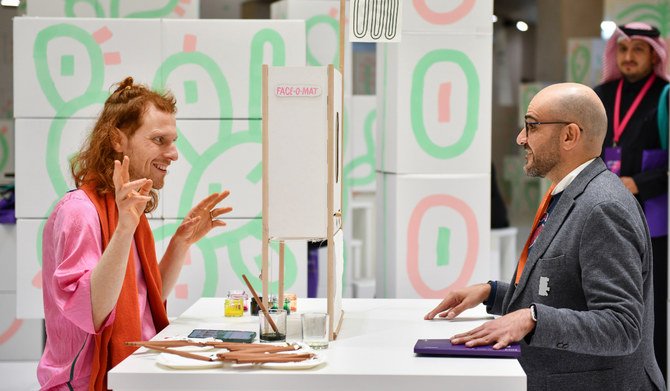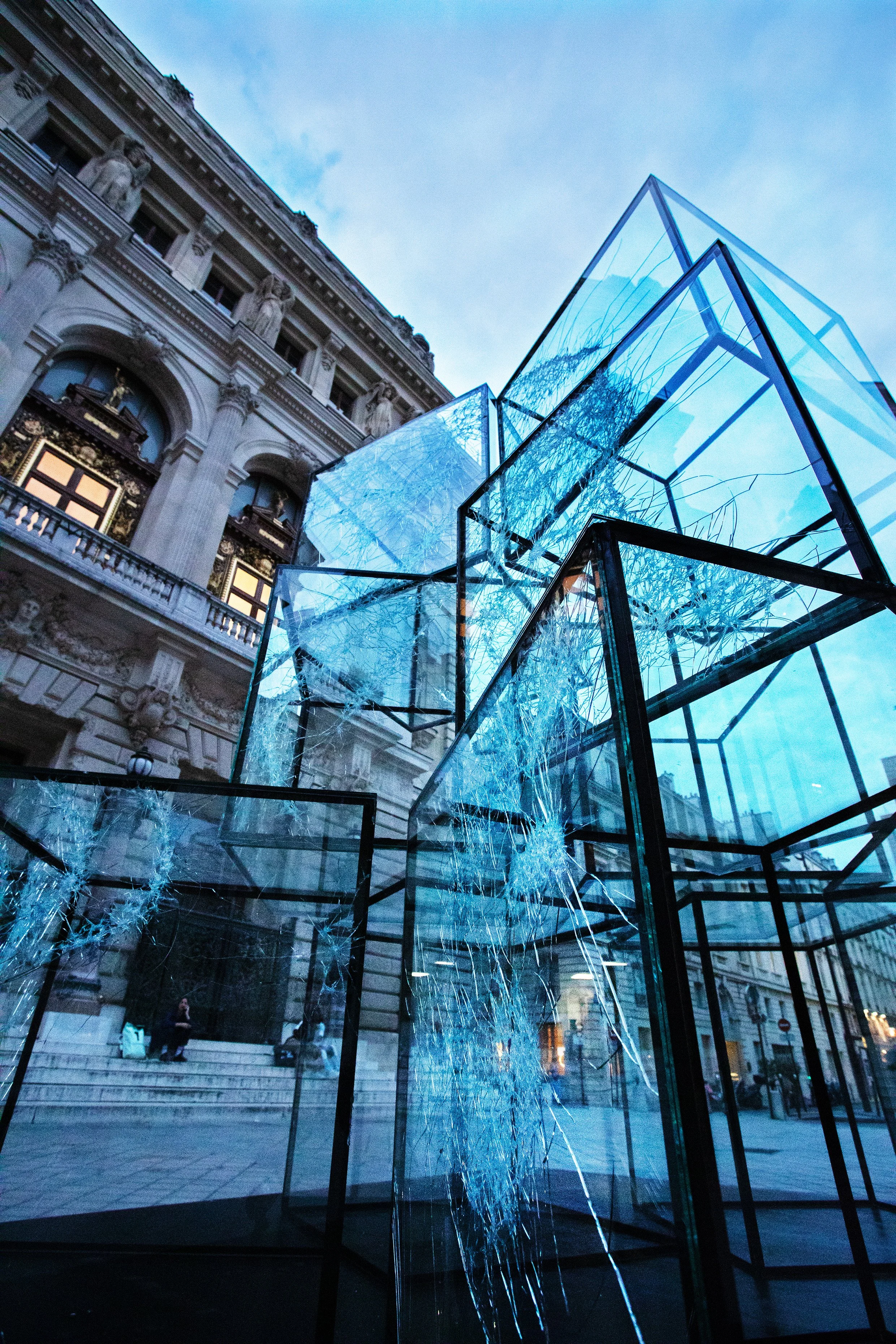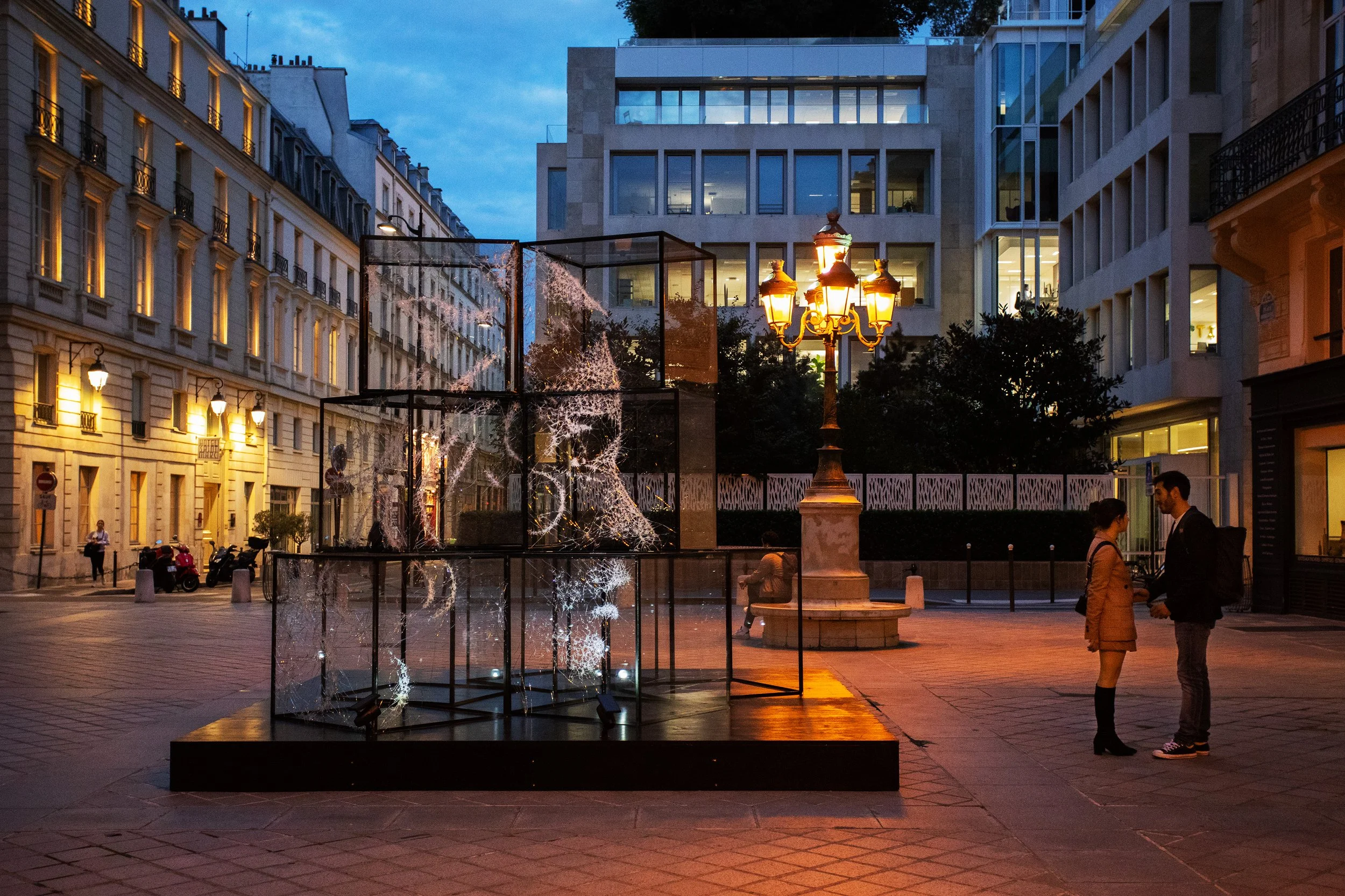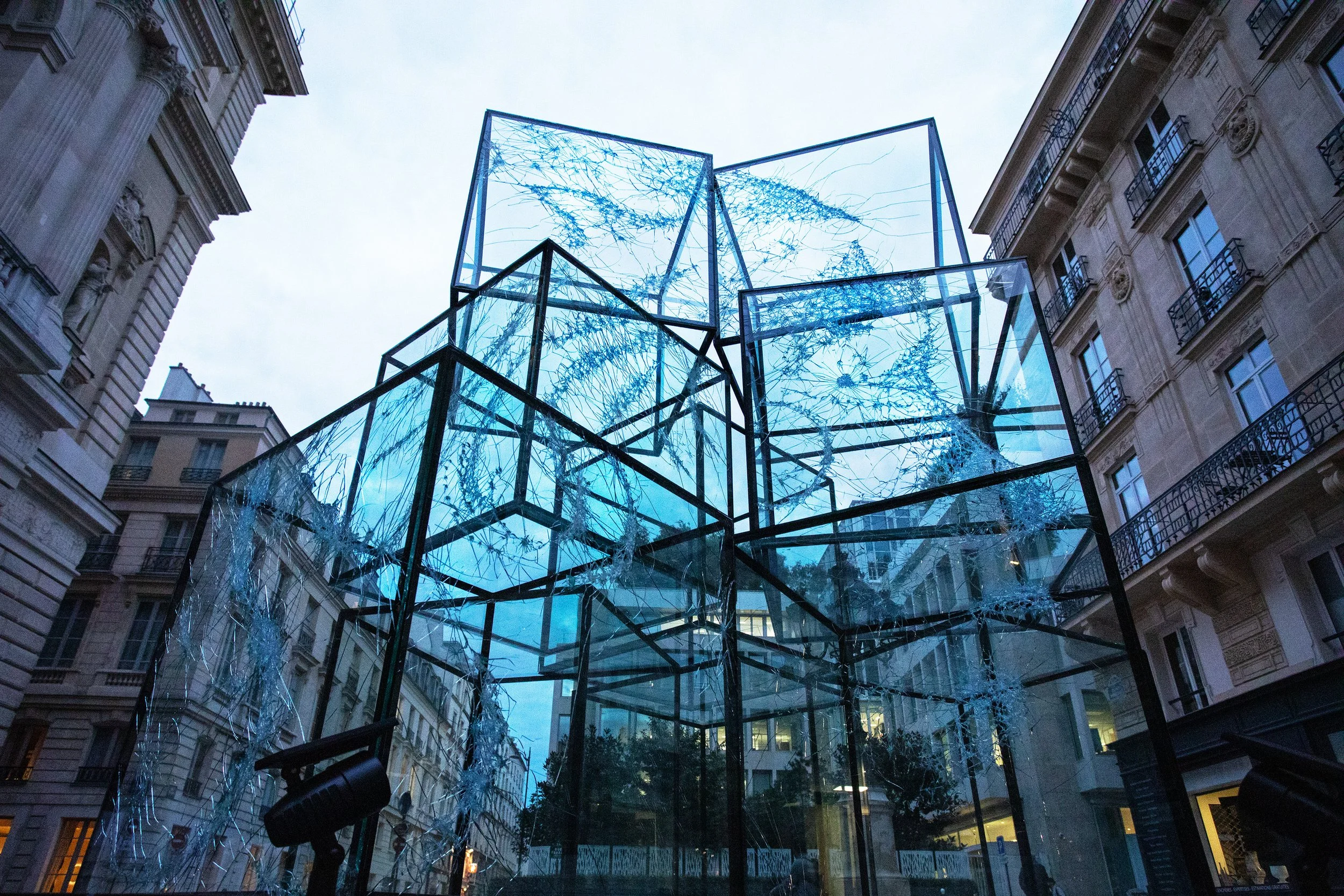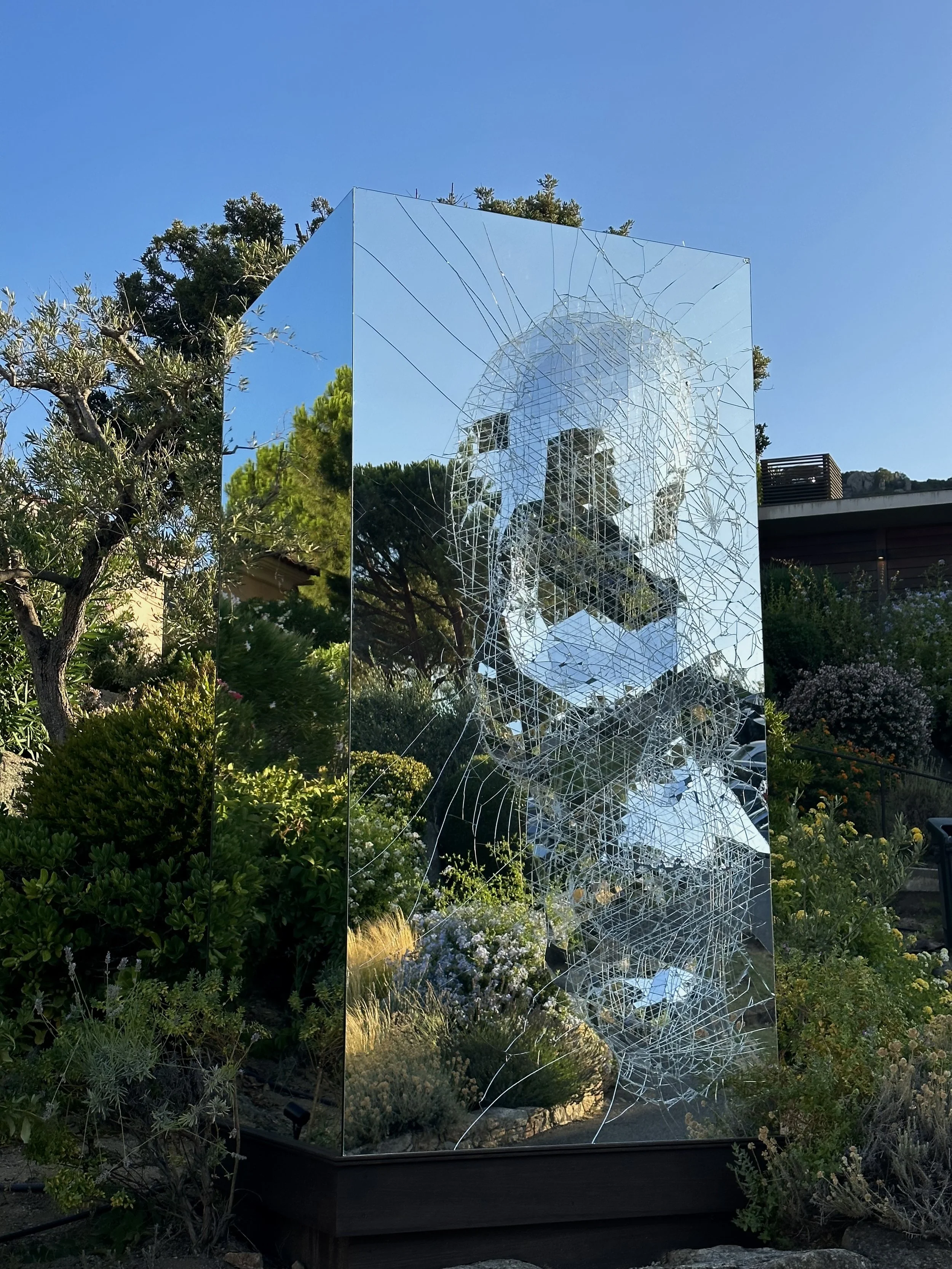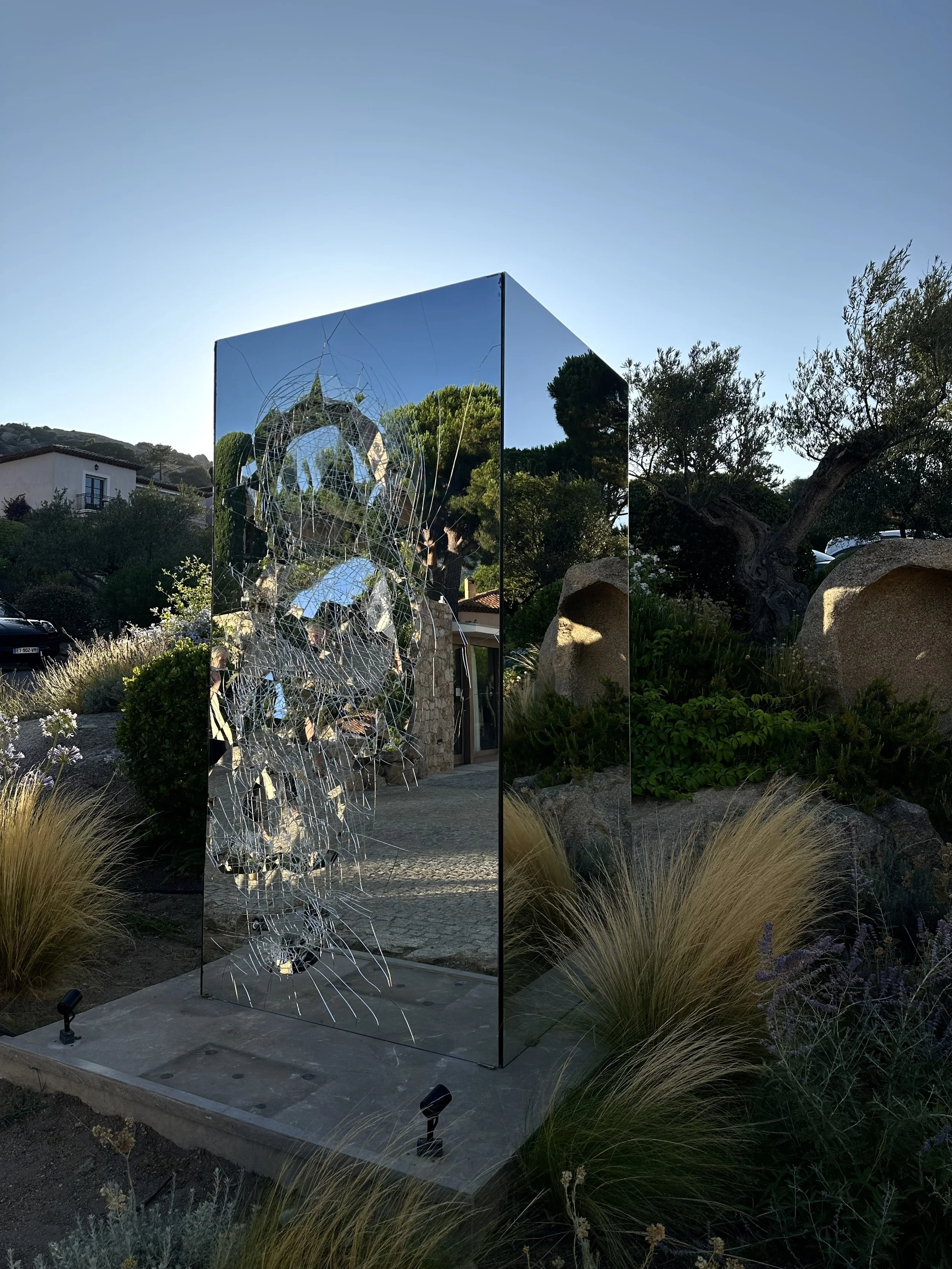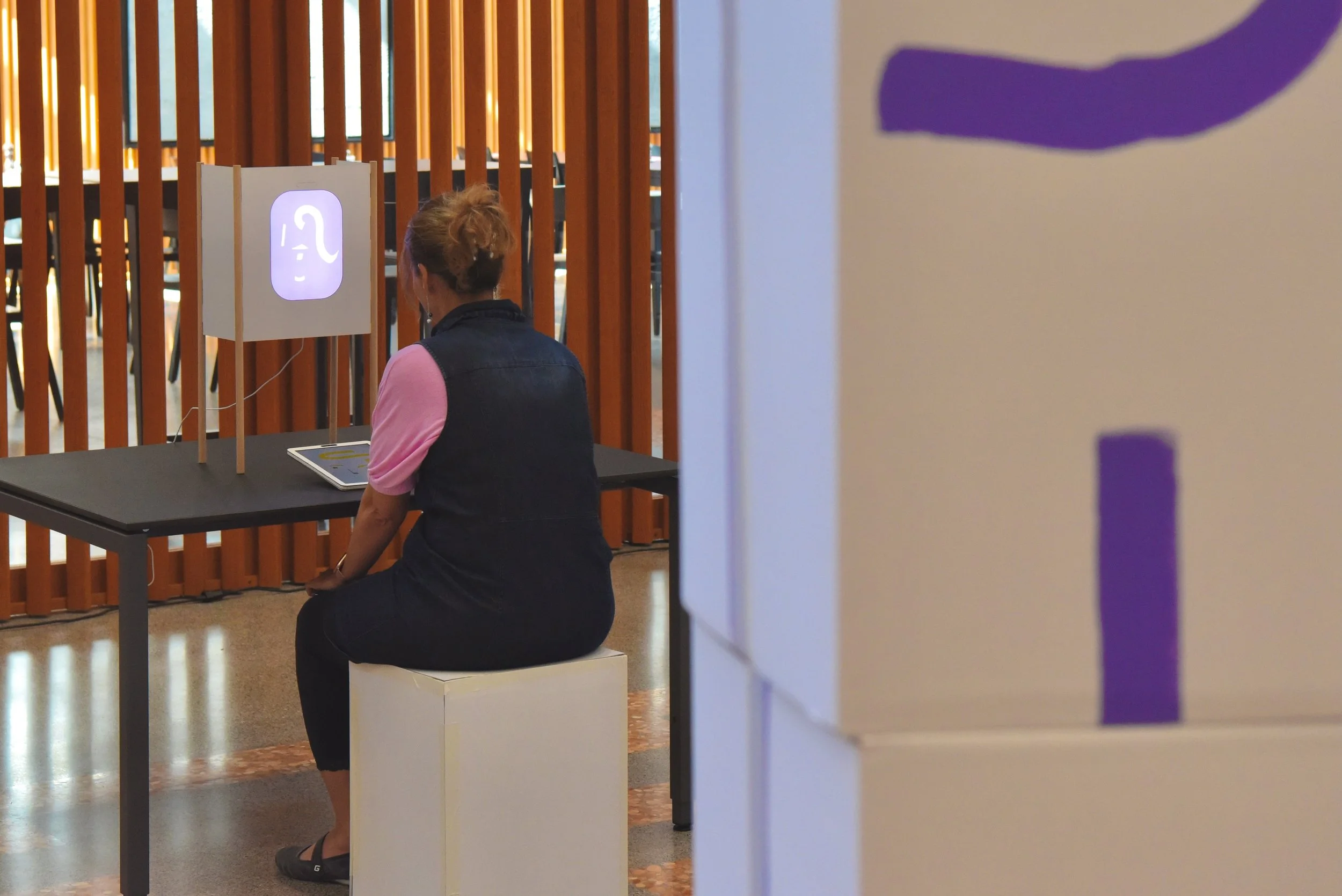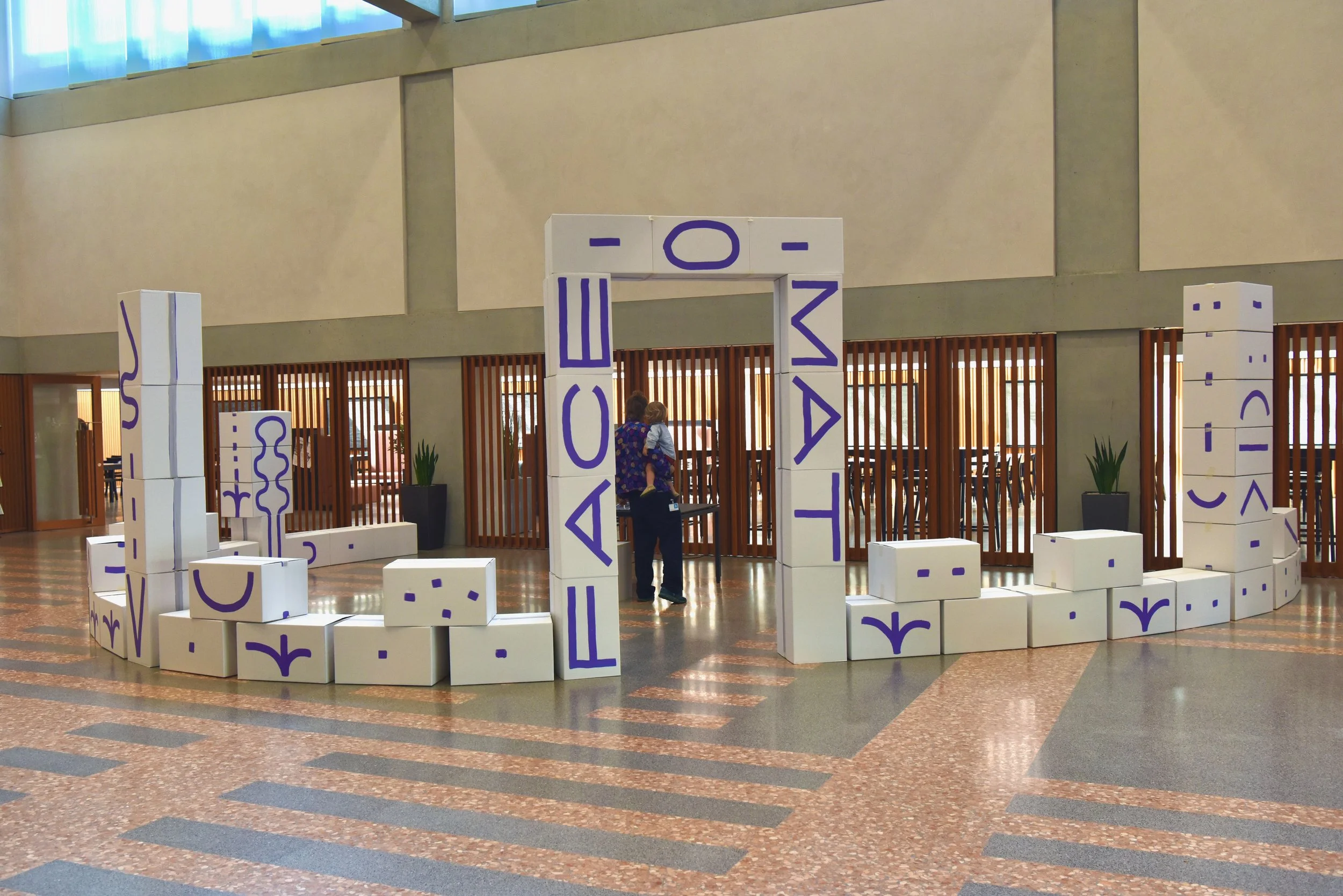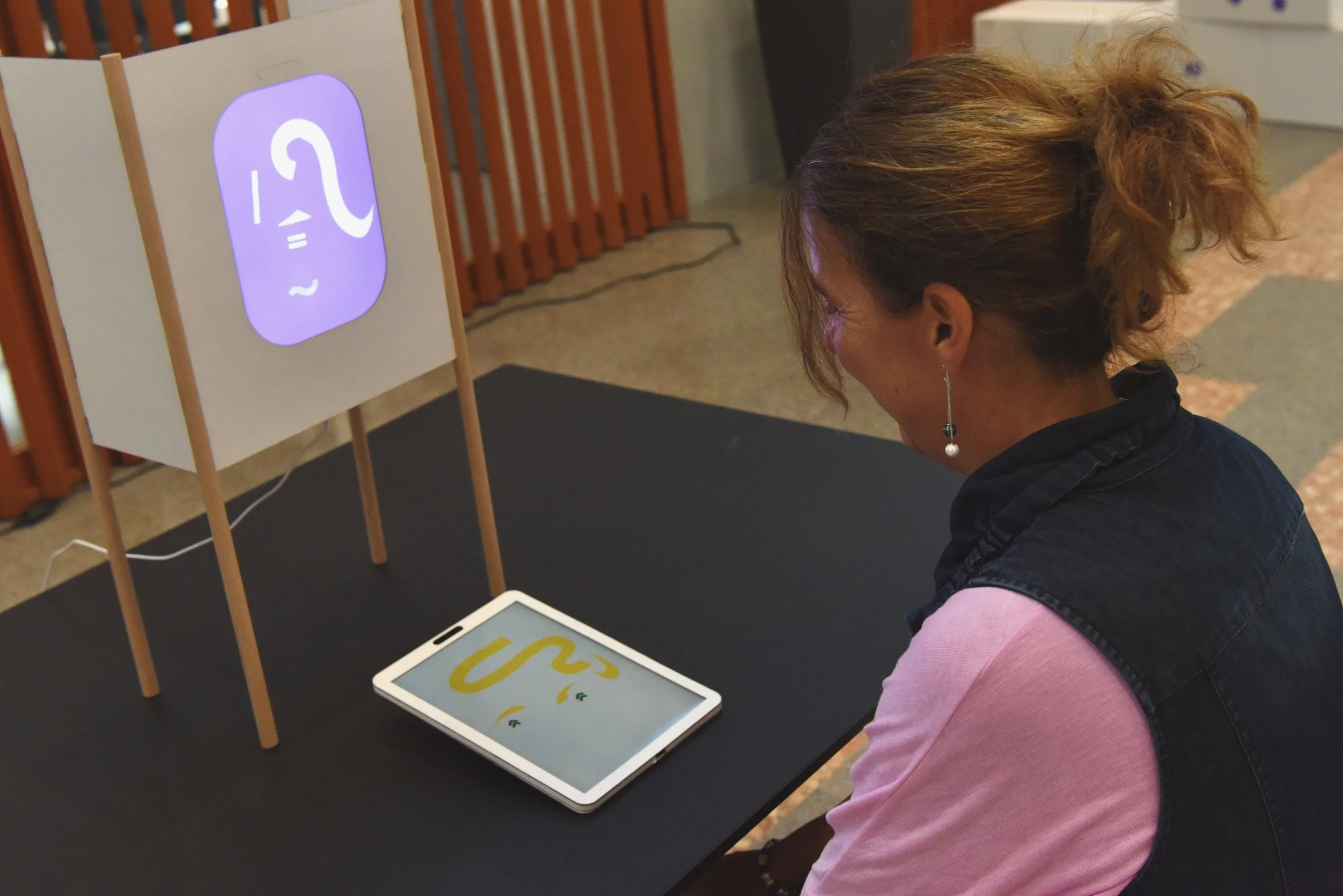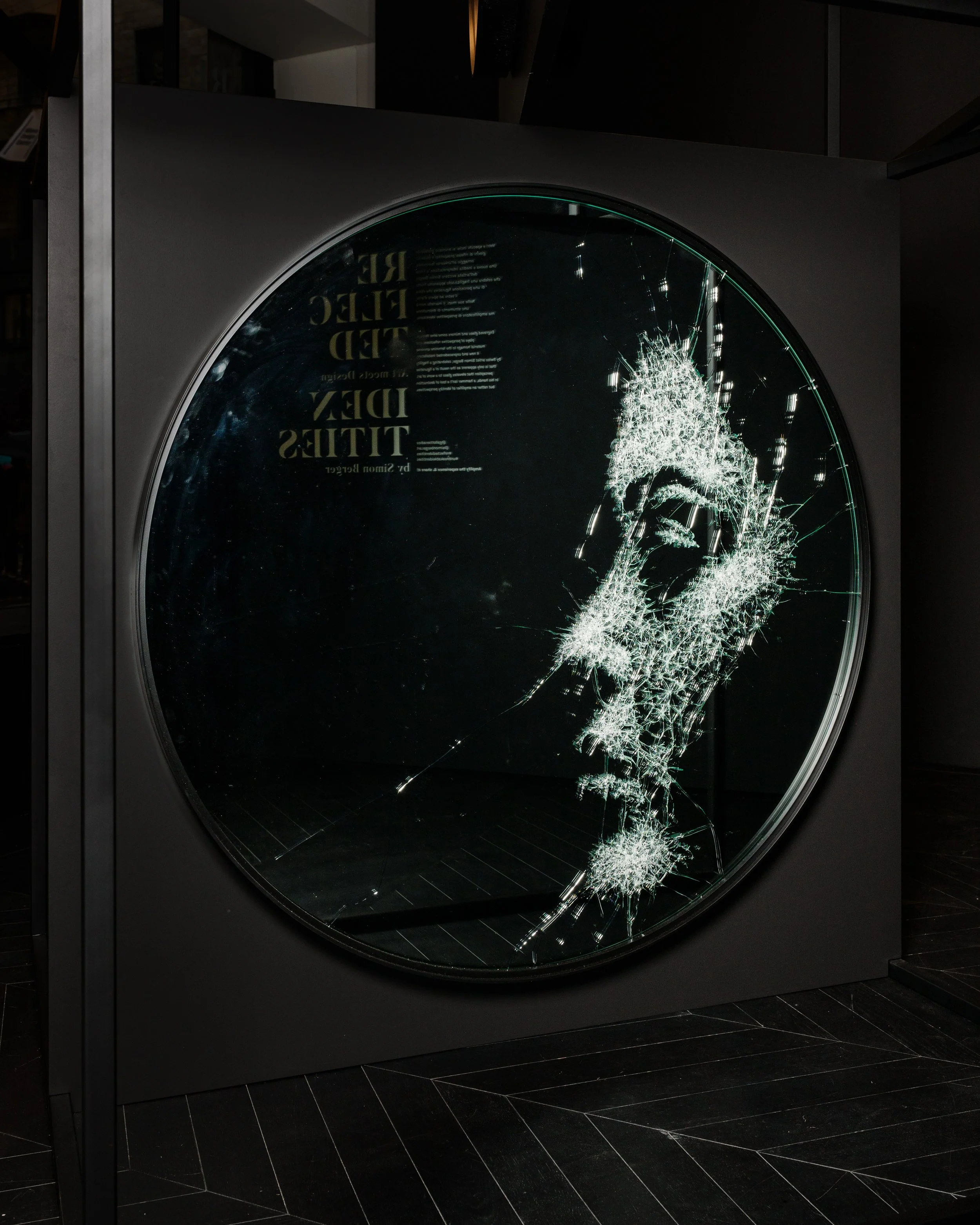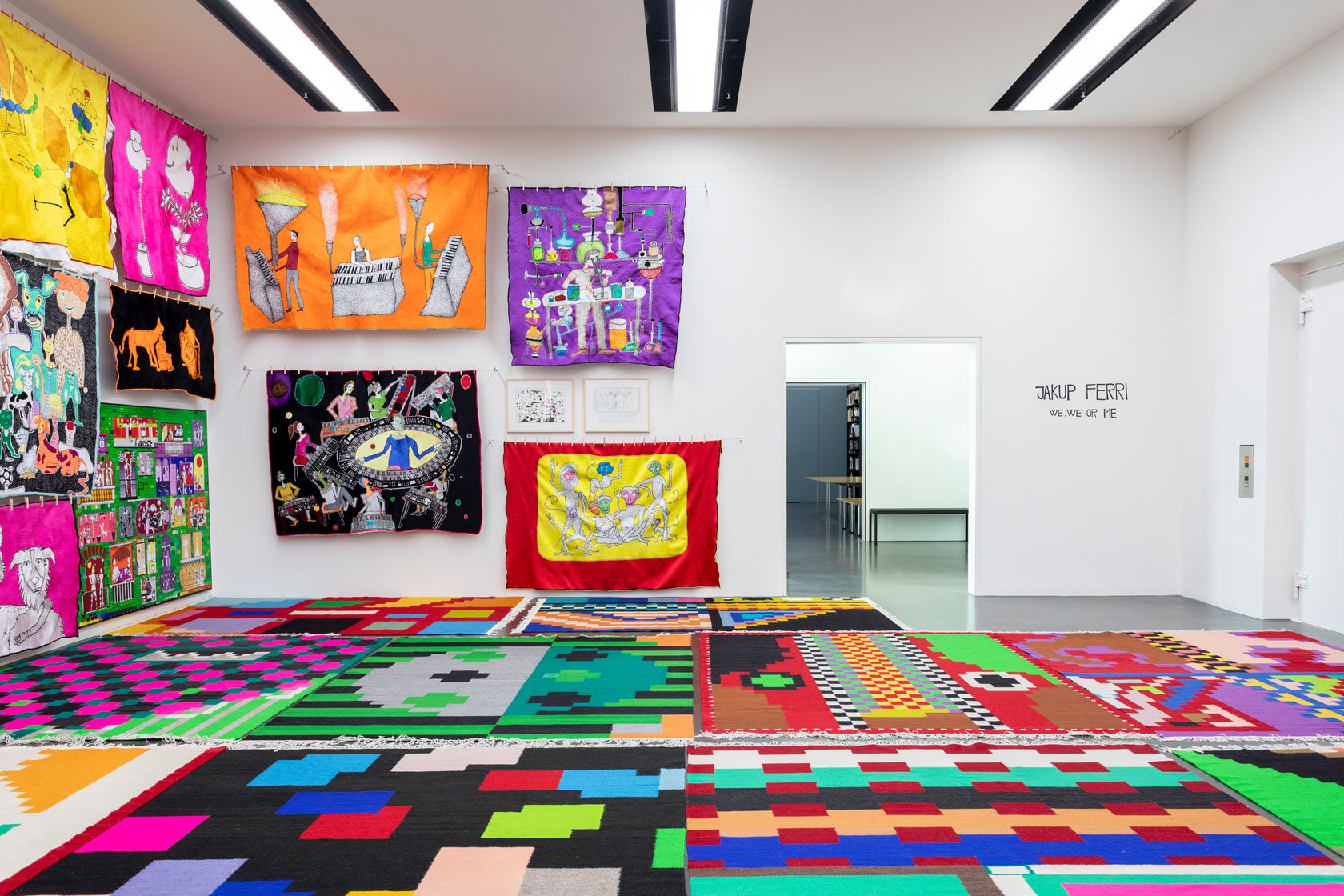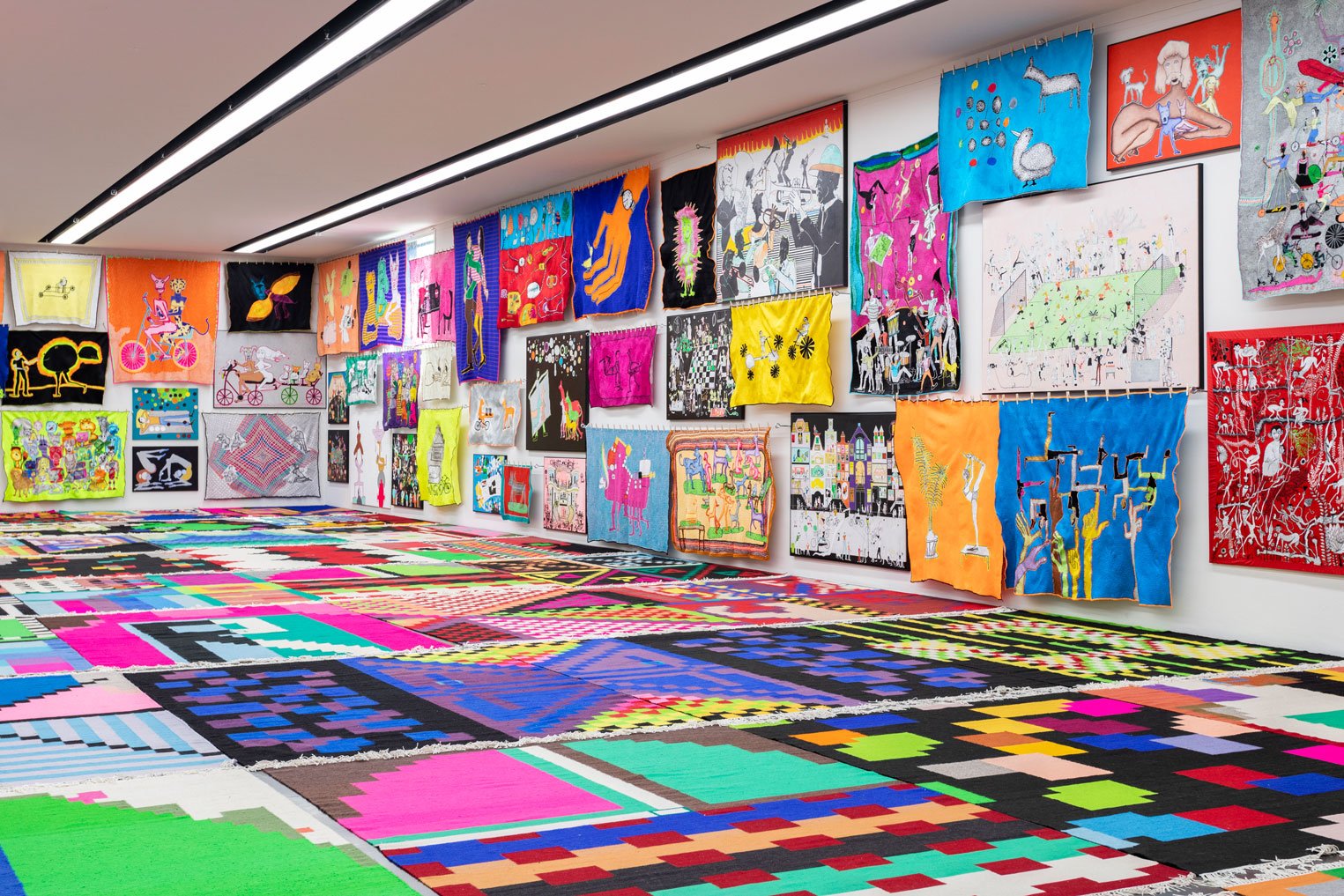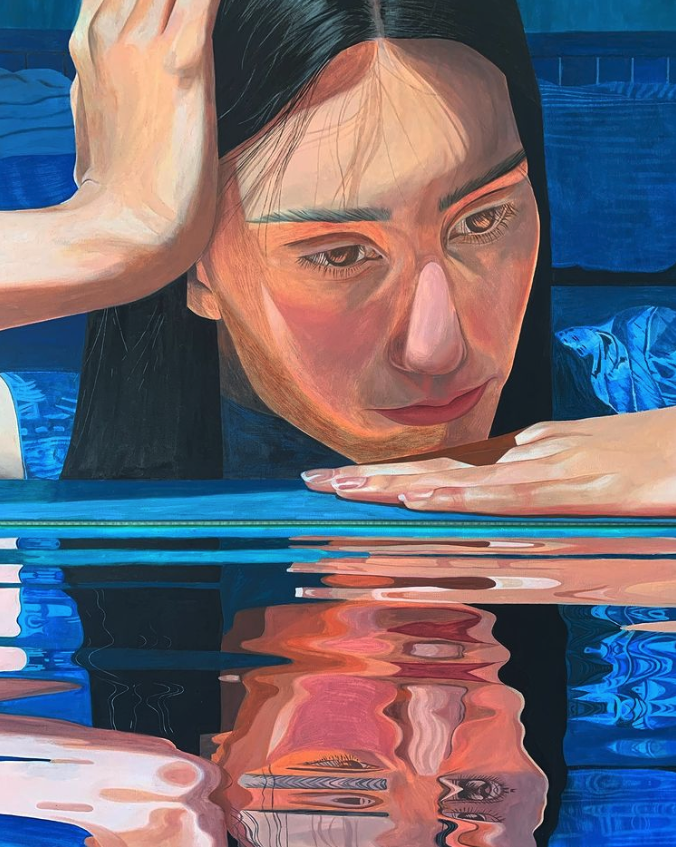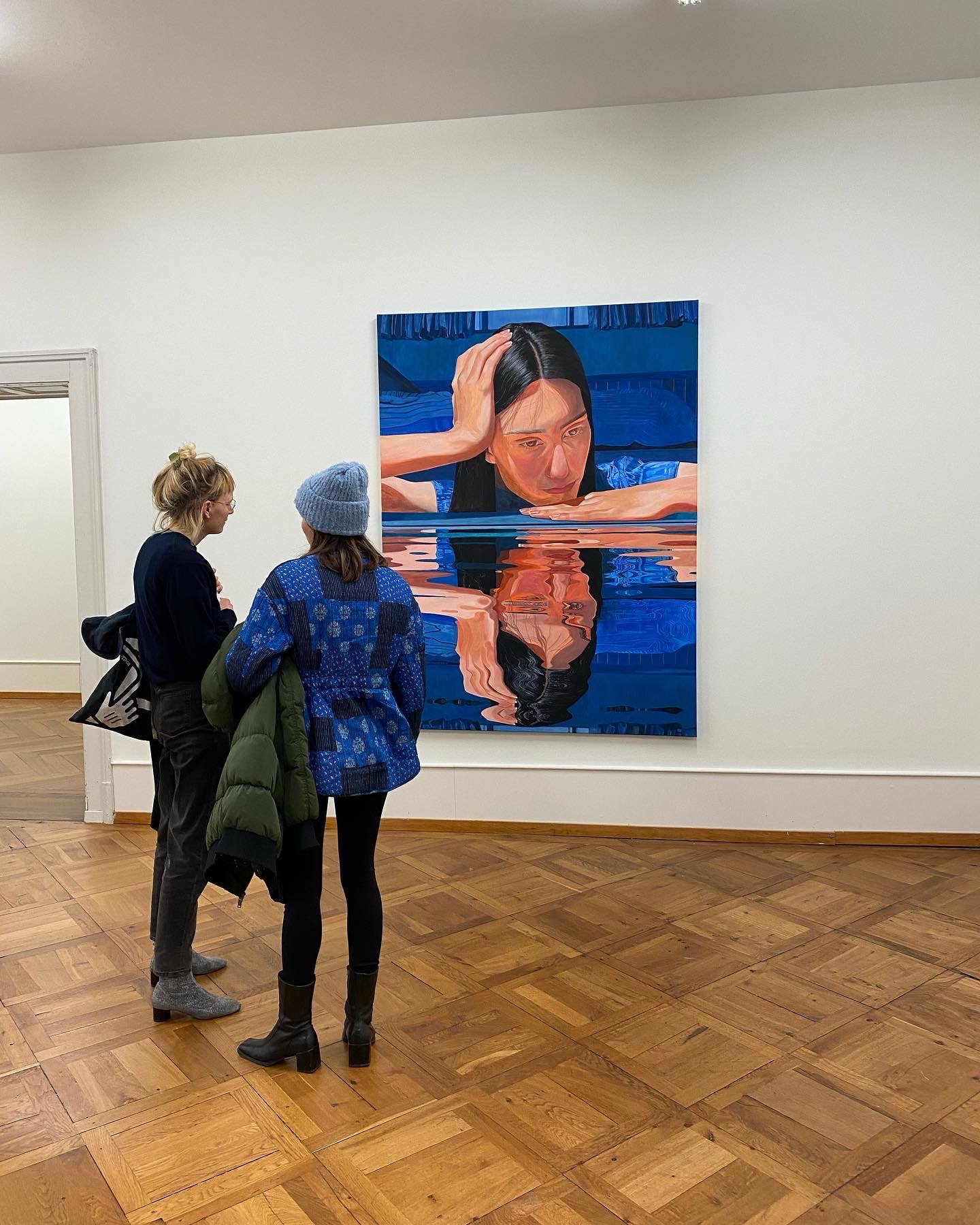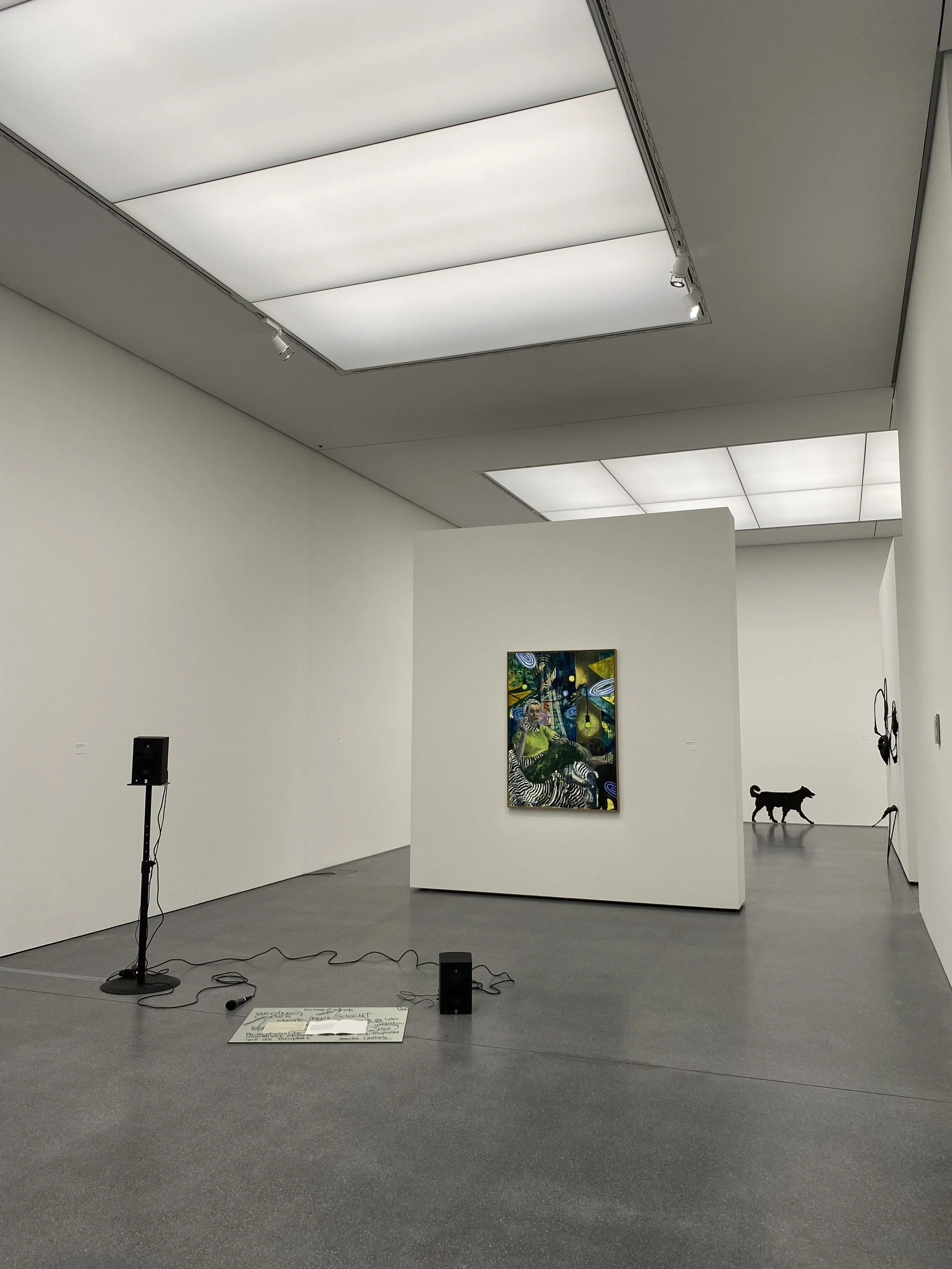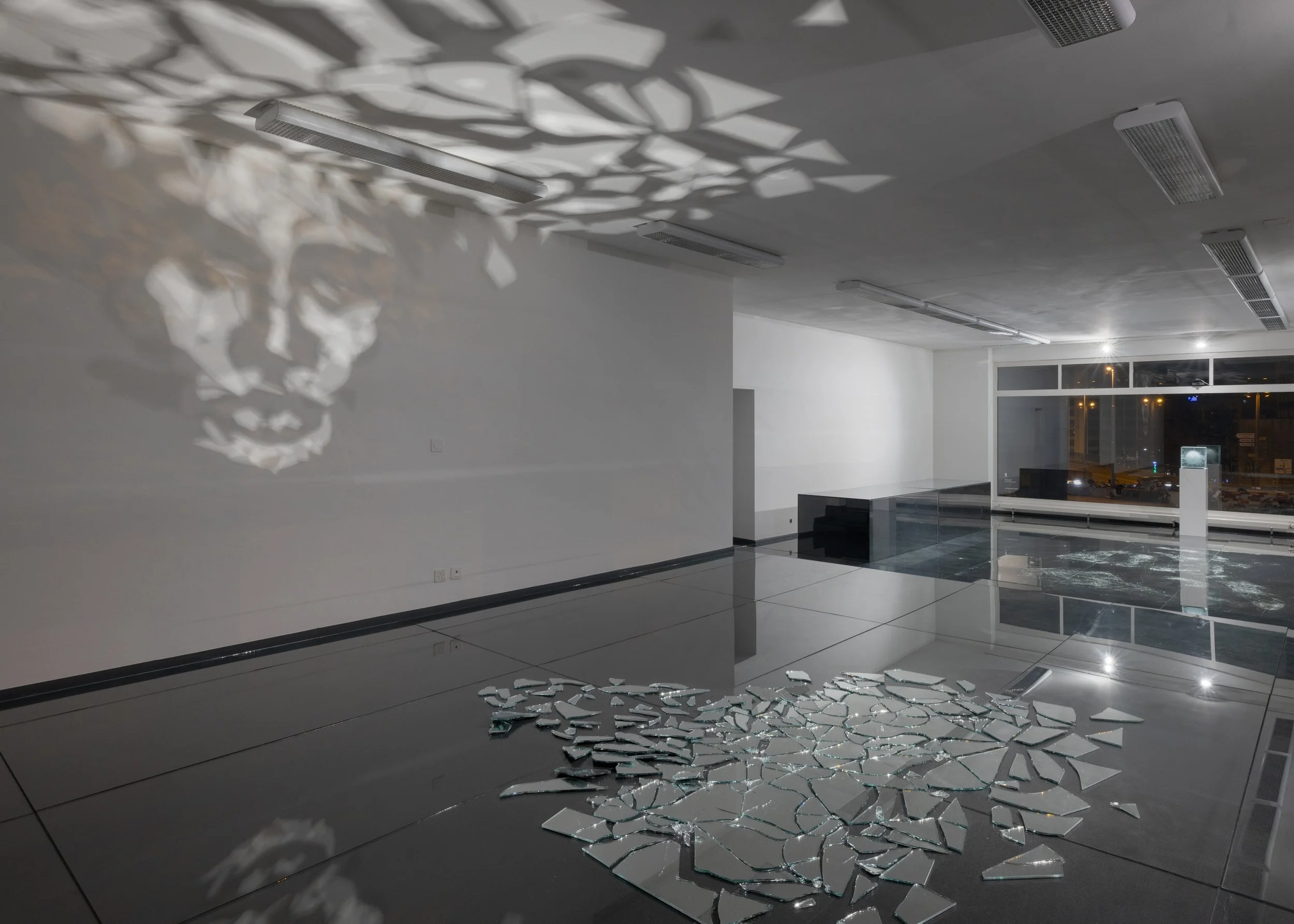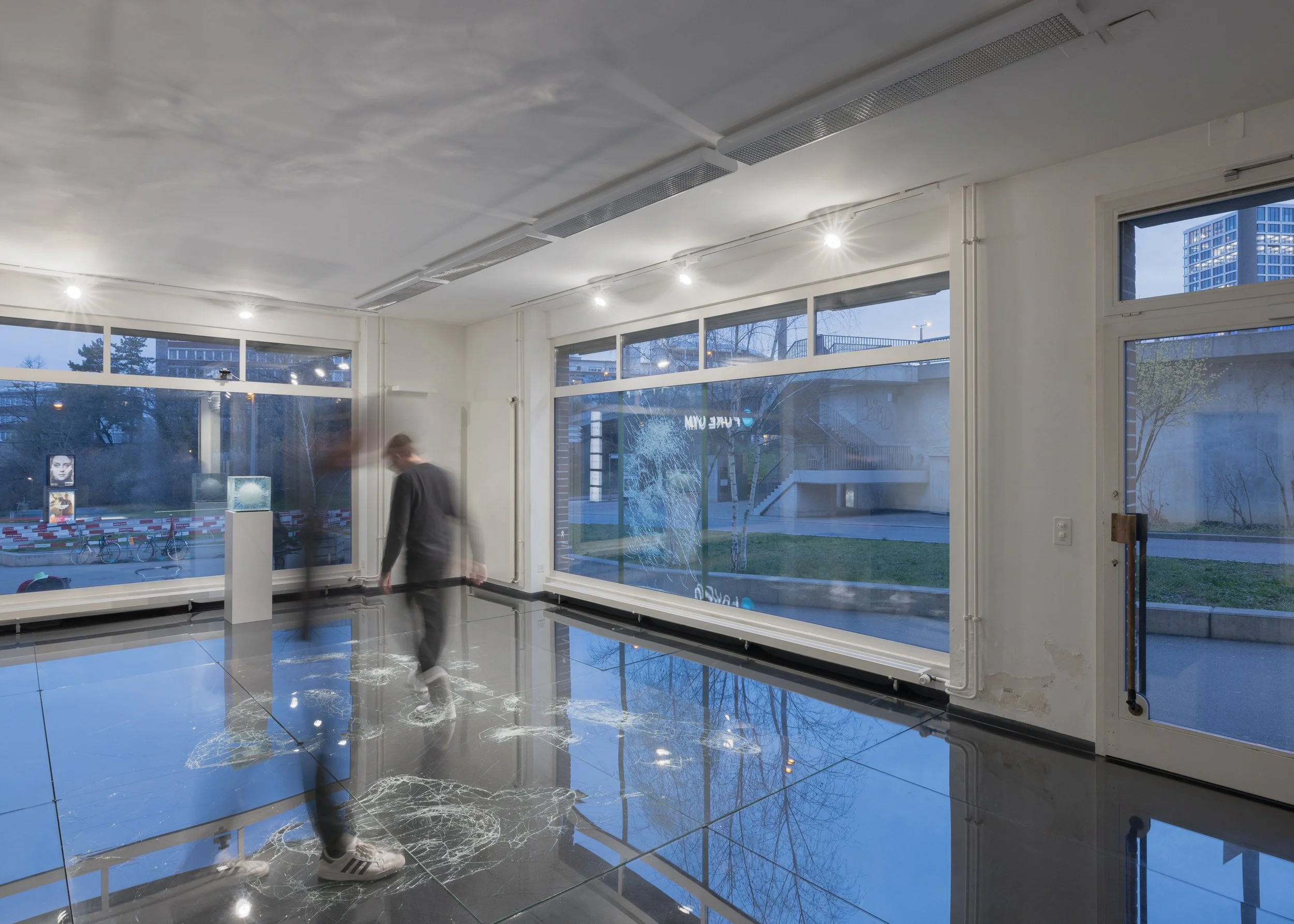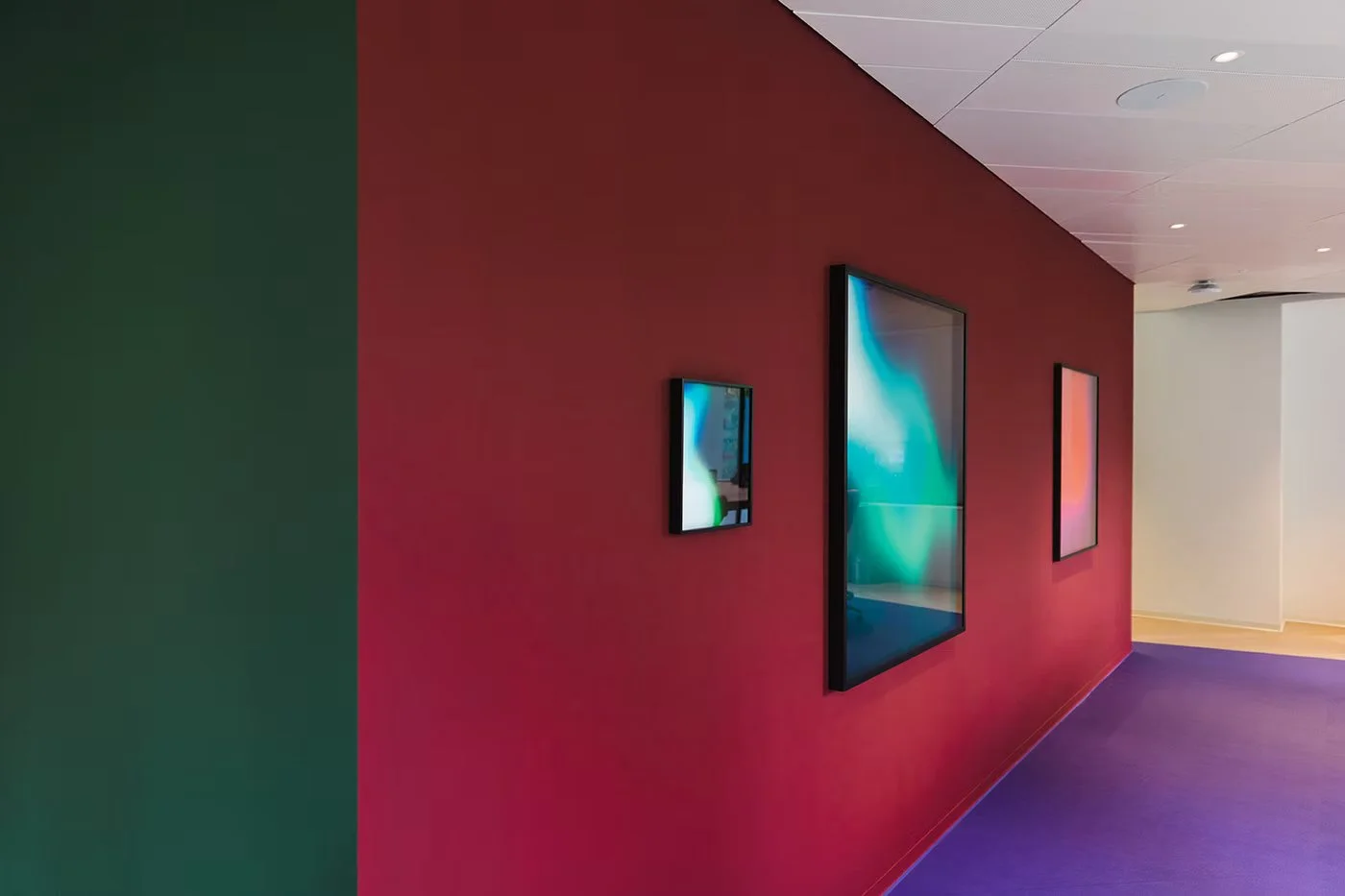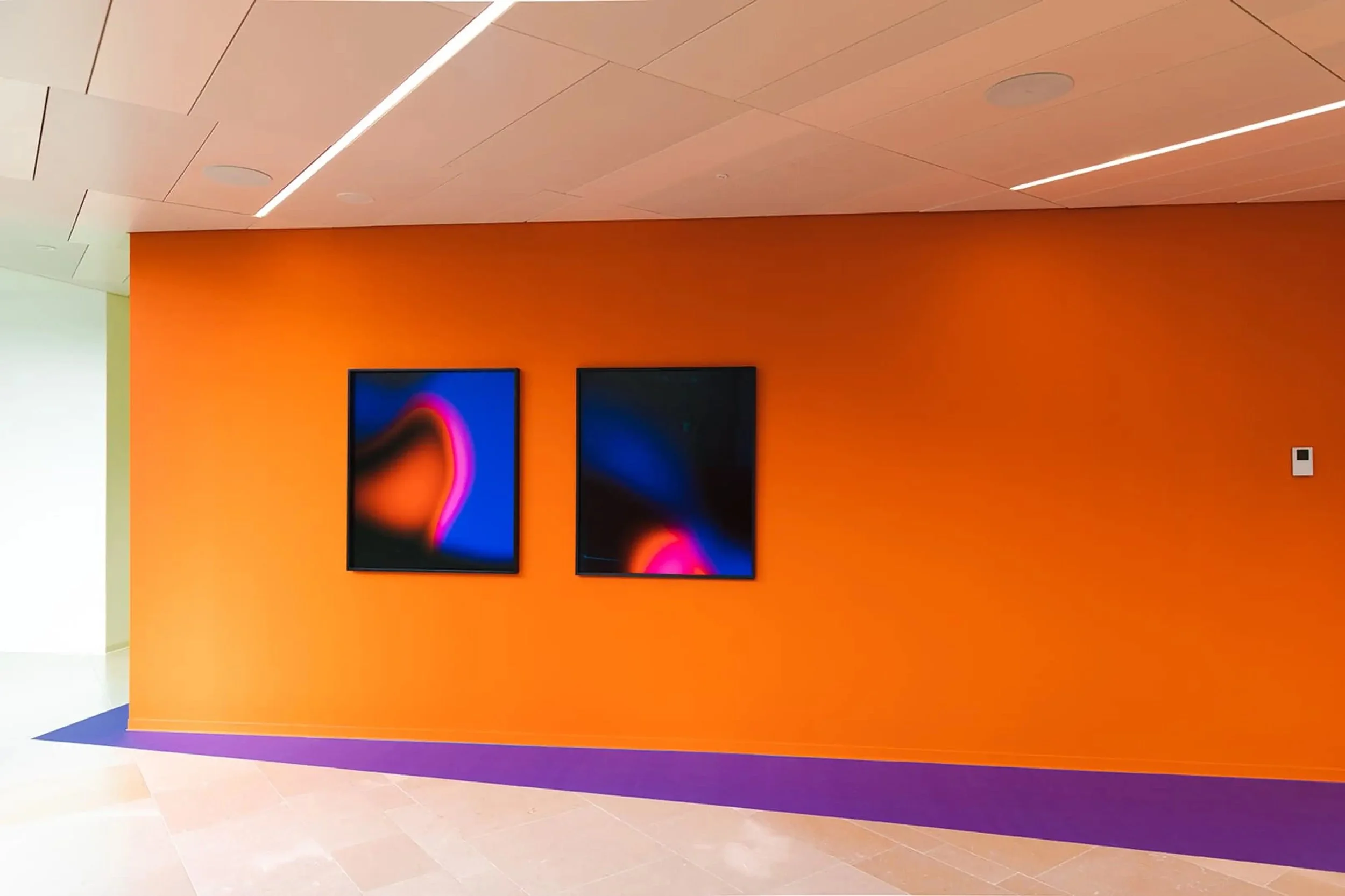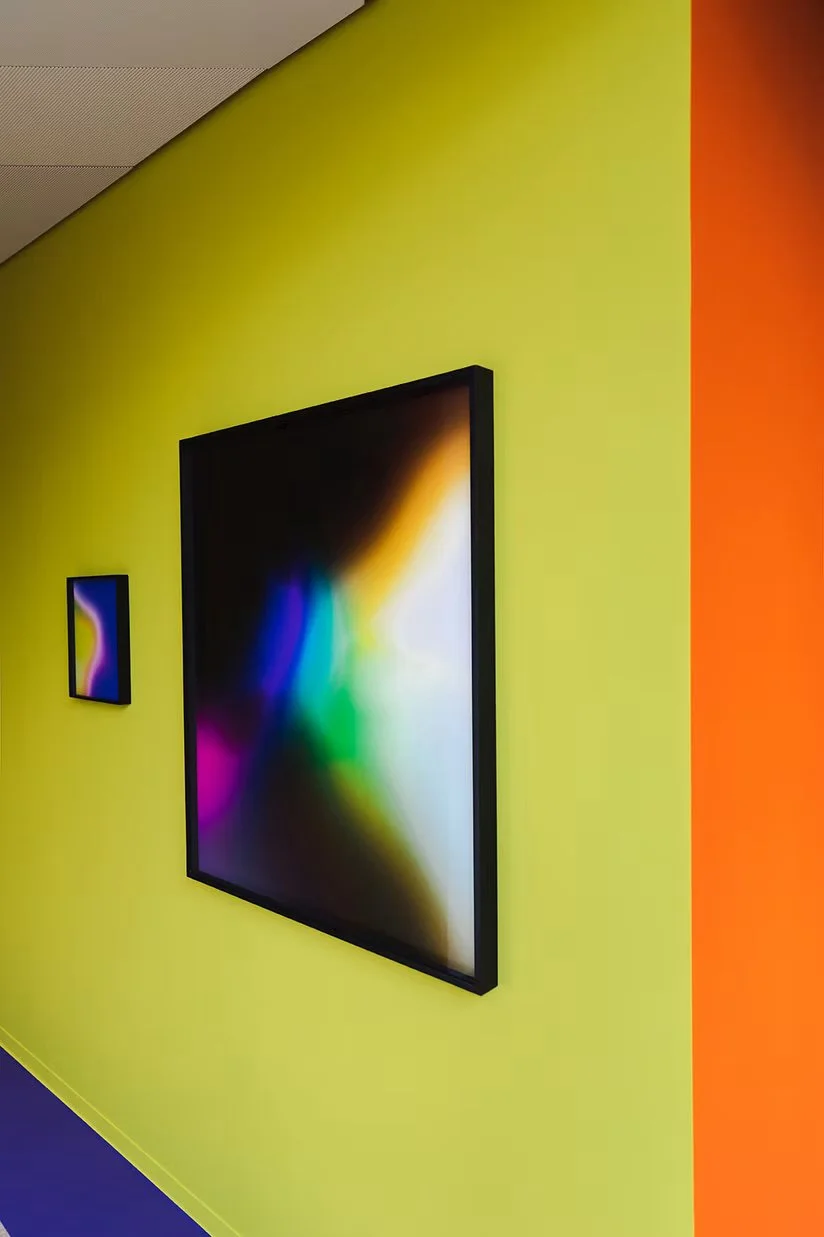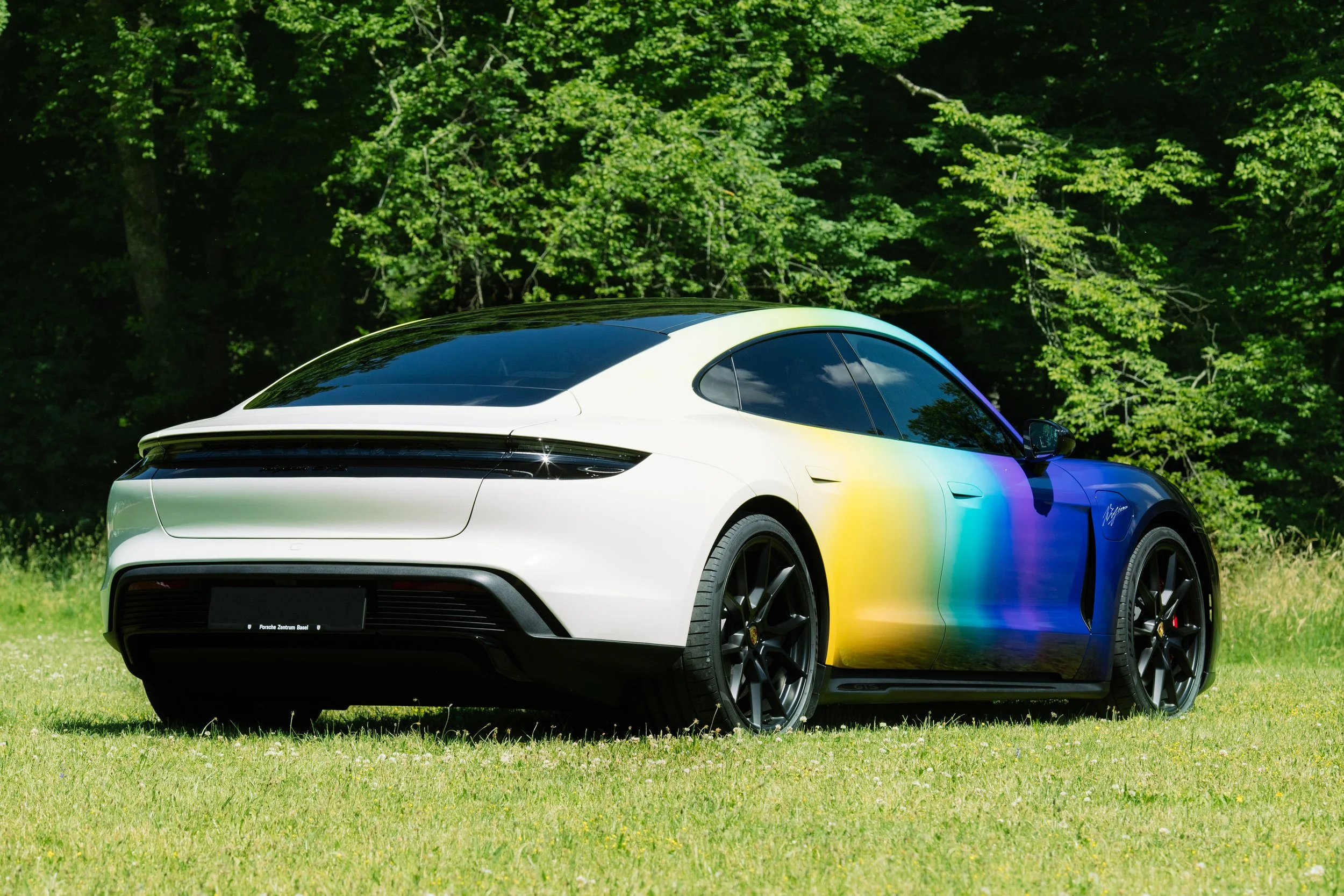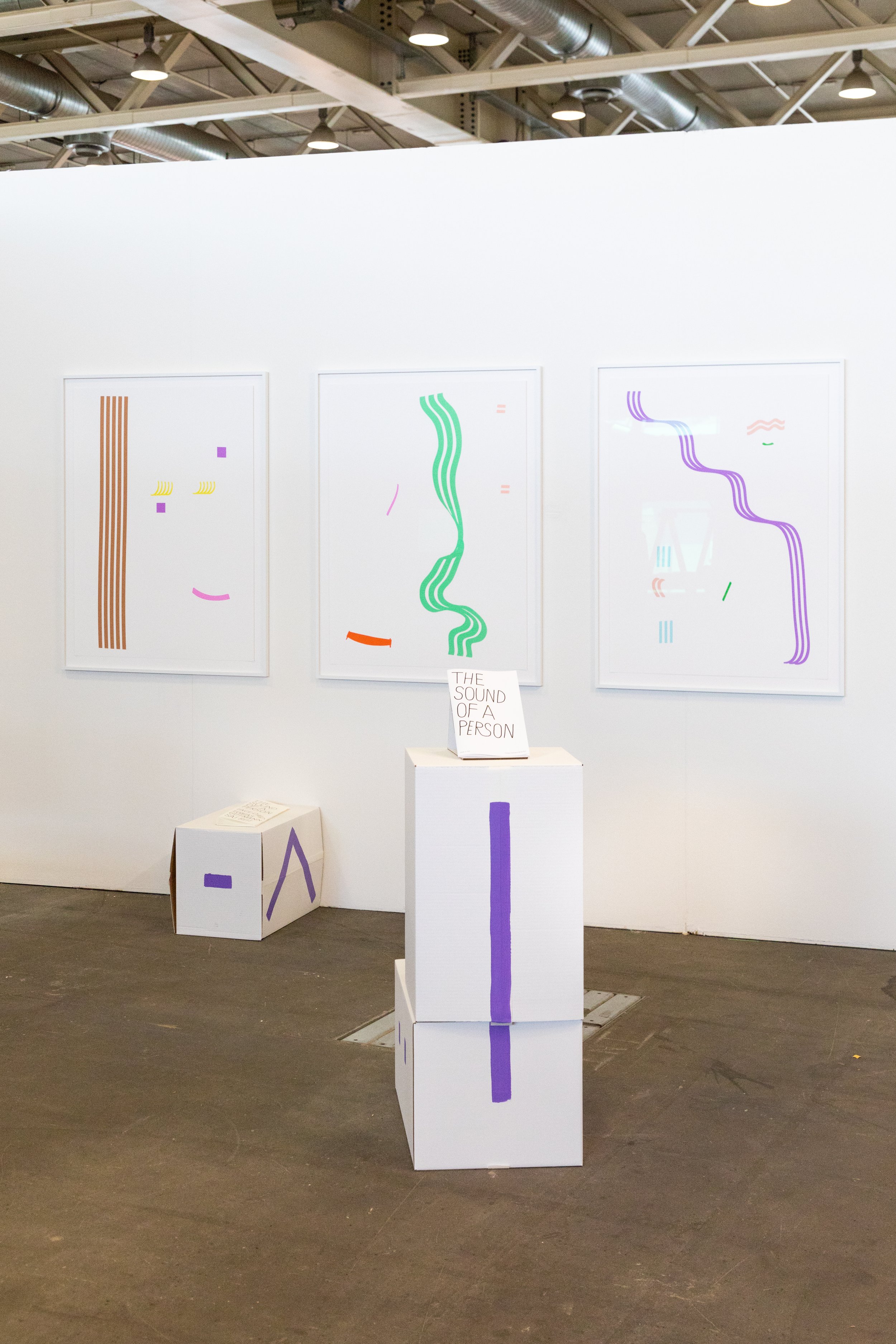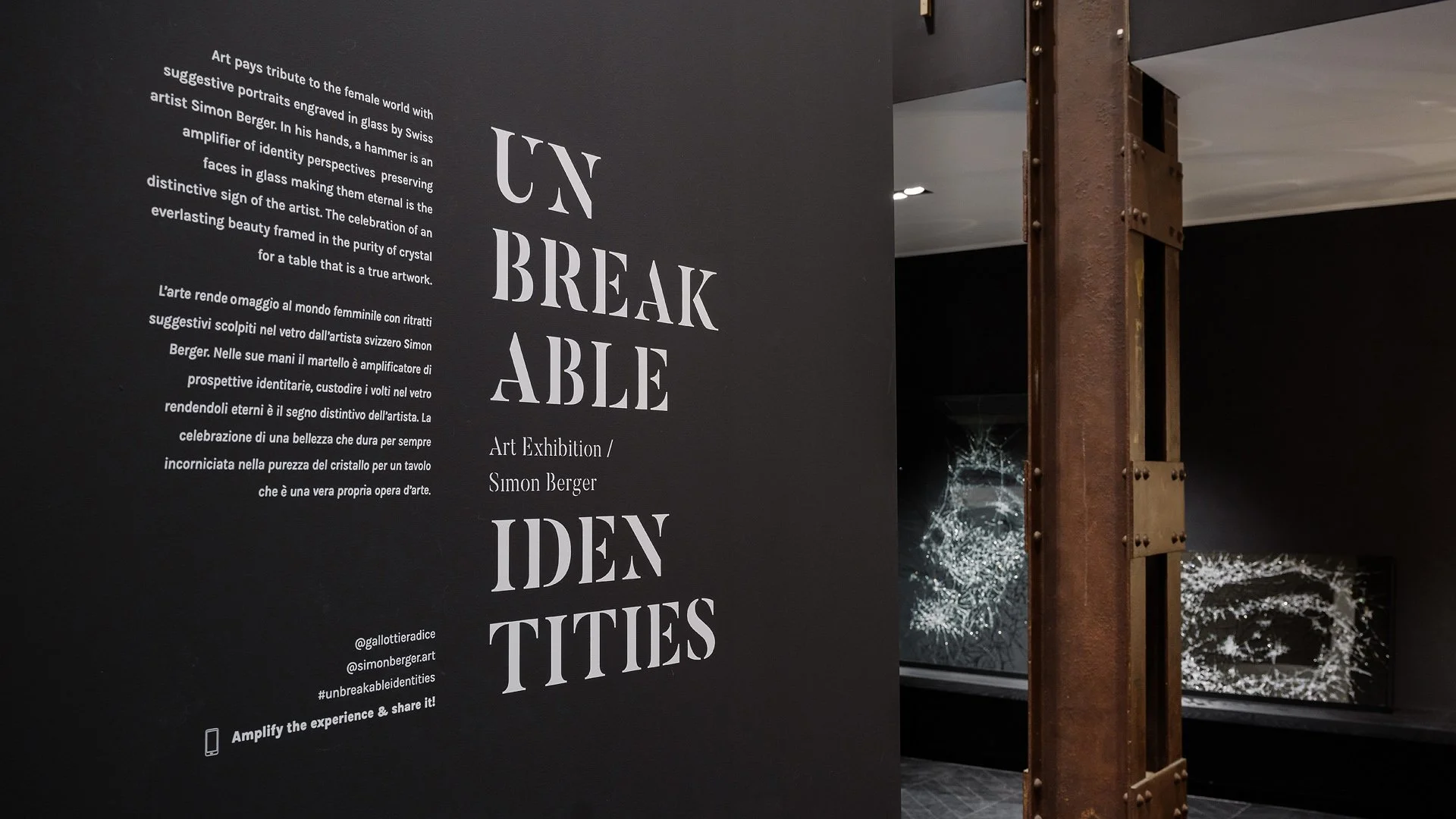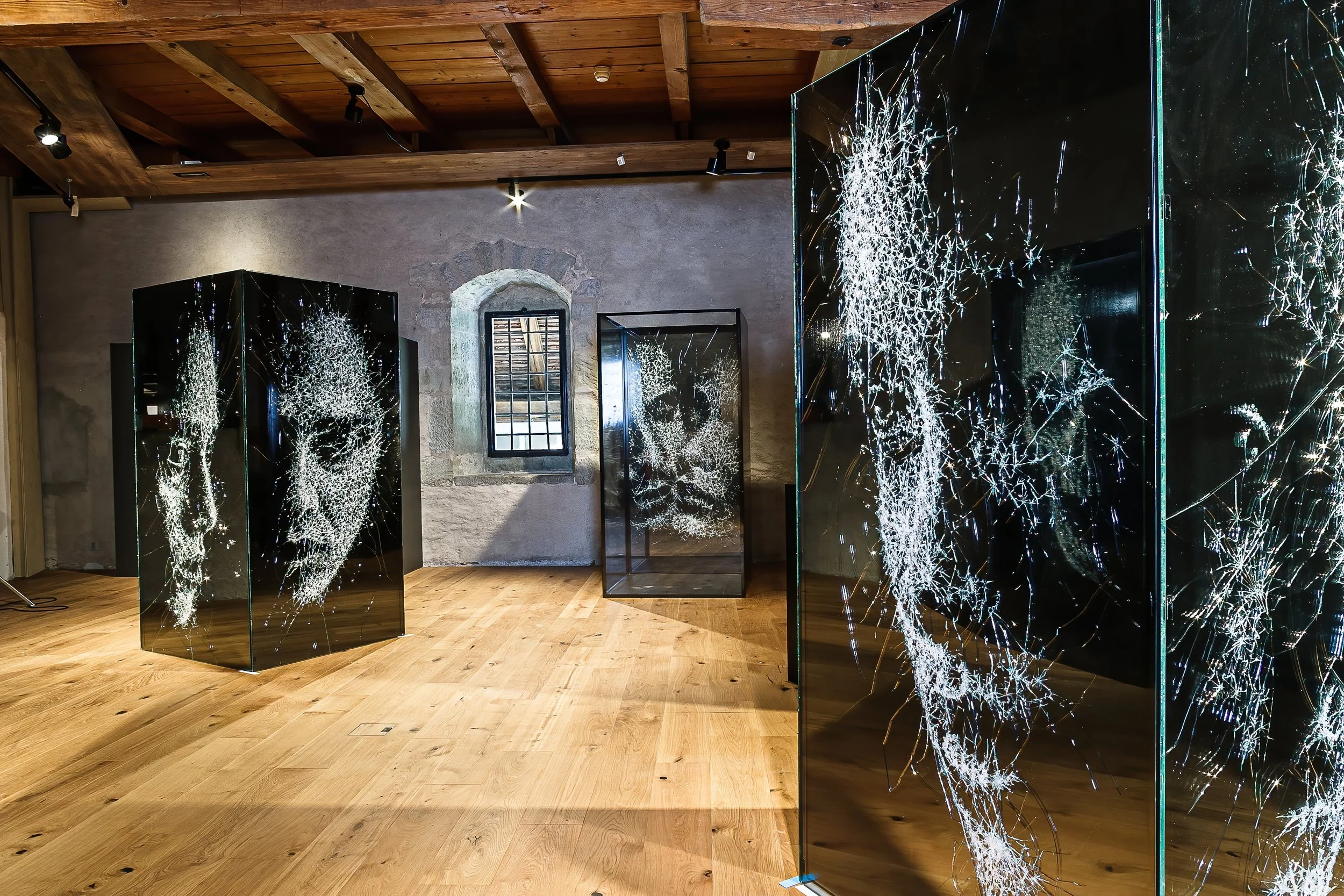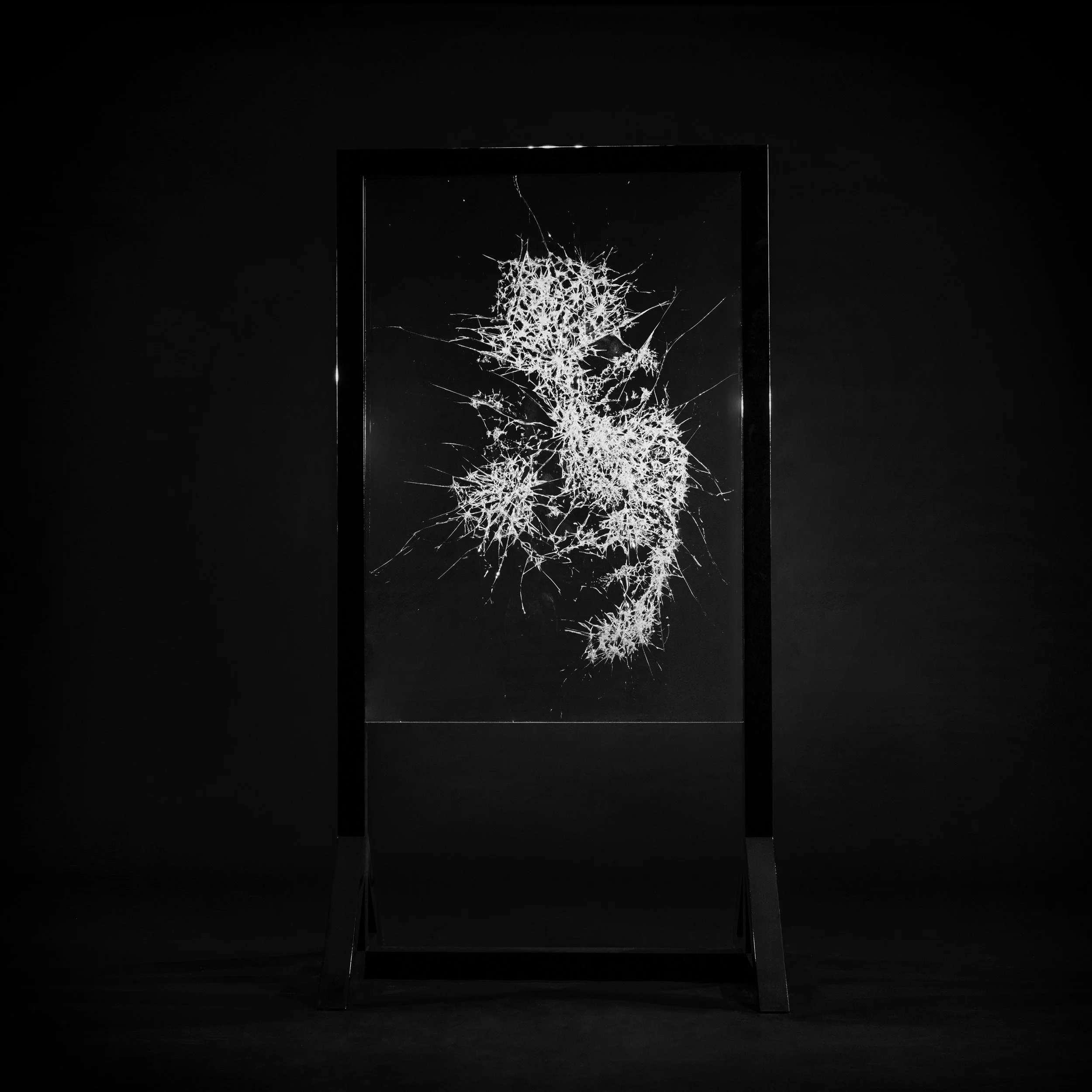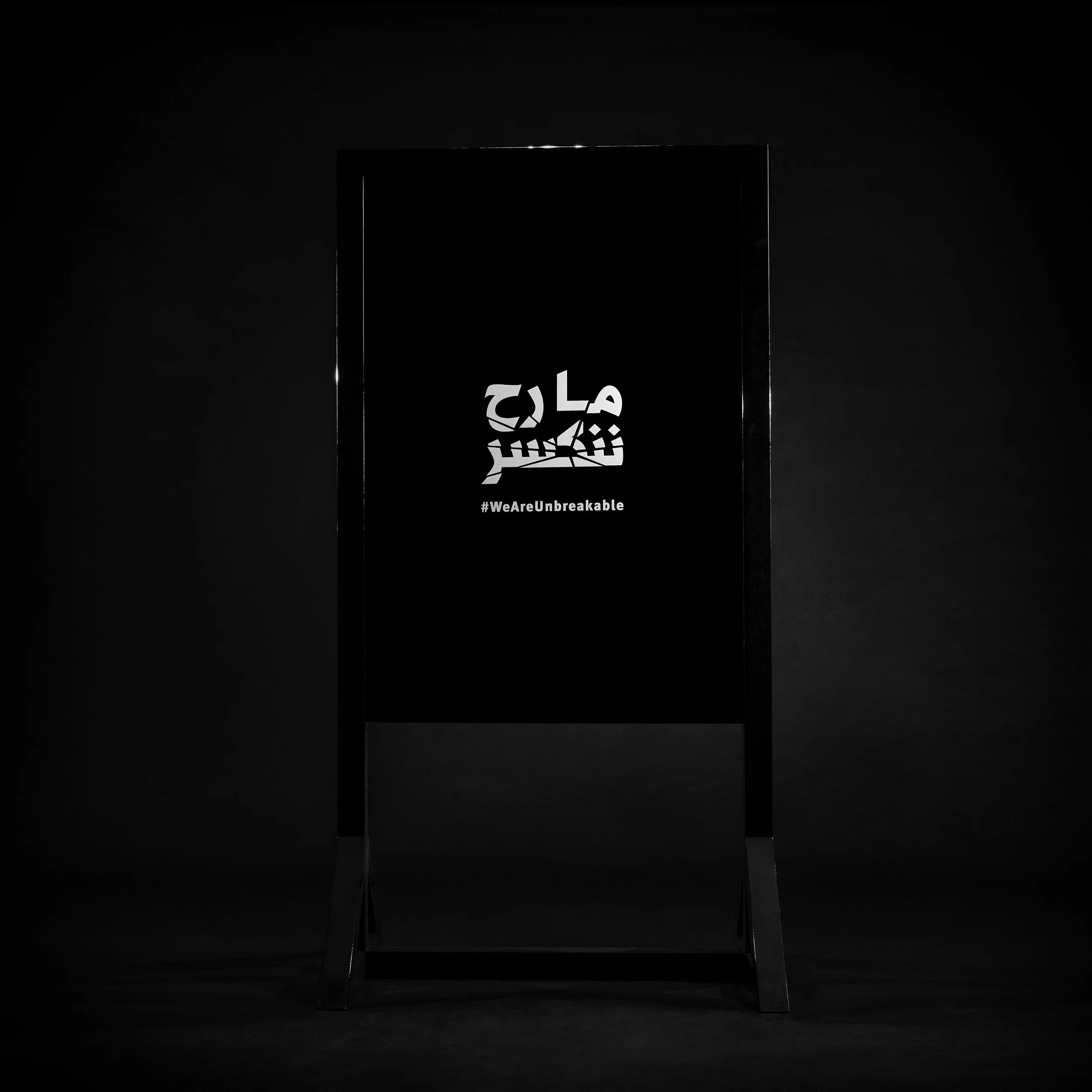ARCHIVE
ARCHIVE
This page serves as an archive of past projects that NOA contemporary artists have been able to realise.
Tobias Gutmann
In collaboration with
Klaipeda Communication Cultural Center
Solo exhibition
Klaipedia, Lithuania
20 June — 24 August 2025
For the first time, Tobias Gutmann will be presenting various of his drawings series in an exhibition space outside of Switzerland.
-
Simply looking at art can increase emotional well-being - especially if it is done repeatedly and consciously, as a recent international study by the University of Vienna shows.[1] Art works through various psychological mechanisms: it encourages reflection, promotes resilience, strengthens a sense of meaning and supports emotional balance. Seeing itself is a healing practice.
But art can do even more. It can create ‘psychological safety’ - that rare inner state in which we can show ourselves without being judged.[2] Although this concept refers primarily to team-building processes, it describes a central characteristic of Tobias Gutmann's artistic work: with his drawings, he creates visual spaces for thought that oscillate between strength and inner insecurity, between visibility and withdrawal, between absolute intimacy and radical openness.
For the first time, Tobias Gutmann is dedicating an exhibition exclusively to his drawings. They are connected works: Each line becomes a silent act of self-encounter, an embodied practice of drawing, a connection in the moment. This moment also creates a quiet resonance between drawing, artist and viewer - a relationship that goes beyond the visible. His visual language moves between abstraction and figuration: fragile beetles, reaching fingers, fragments of letters, dots and signs emerge from just a few strokes - sometimes non-representational, sometimes astonishingly concrete. Some works appear contemplative, almost spiritual, while others deal more clearly with our relationship to the world, to nature and to the body. His word drawings condense sensations into poetic fragments, but always leave room for personal interpretation.
‘Hello, bye. Hi, bye. Hello, bye.’ What sounds like a casual murmur is condensed into a cycle of life: birth as hello, death as goodbye - and in between a constant coming and going. ‘My life was characterised by these hellos and goodbyes,’ says the artist looking back. As a child, he often moved, changed schools, said goodbye to places before new encounters began. These experiences resonate in his work today - in text drawings that hover between lightness and profundity, and in lines that open up rather than define. They are visual transitions - fleeting, fragile, permeable - and at the same time borne by a quiet curiosity and constancy. Lines return again and again, repeating themselves in seemingly simple gestures, almost banal - and yet each one is slightly different, a nuance in the rhythm of the drawing. Their repetition reveals a quiet persistence from which a new, larger whole emerges: a form that does not impose itself, but unfolds.
This exhibition can be understood as an invitation: to encounter the artist's personal history, to search for one's own meaningfulness and psychological security, to experience stability and meaning in an often turbulent world. The exhibition thus becomes not only a space for thought, but also a space for dialogue.
Text by: Dr. Ismene Wyss
[1] MacKenzie D. Trupp et al. (2025) The Impact of Viewing Art on Well-Being. A Systematic Review of the Evidence Base and Suggested Mechanisms. The Journal of Positive Psychology, 1–25. https://doi.org/10.1080/17439760.2025.2481041.
[2] Pia Stalder, Paula Nestea & Leila Gisin (2022) Psychologische Sicherheit.
© Domas Rimeika
Simon Berger
Origins
In collaboration with
Galerie Adriano Ribolzi
Solo exhibition
Monaco
1 July — 30 July 2025
This is the story of two Swiss « pioneers »; one who chose to create his gallery in the Principality of Monaco, where no one expected him, and the other who decided to thwart the very essence of the material he works with to create fascinating portraits that seem to emerge from the very heart of the glassy material.
Hinano Hayama
Group Exhibition
In collaboration with
Sukiwa Nishiogi Gallery
Group Exhibition
Tokyo, Japan
11 July — 31 July 2025
Hinano Hayama took part in a beautifully curated group exhibition at Sukiwa Nishiogi in Tokyo — a vibrant snapshot of emerging contemporary practices in Japan today.
Hayama’s work resonated deeply, offering a quiet, emotive counterpoint within the exhibition. Through her delicate yet powerful visual language, she invited visitors into a tactile universe of memories, moments, and material traces.
Simon Berger
A Matter of Metamorphosis
in collaboration with
Cris Contini Contemporary
Solo Exhibition
Municipality of Casarsa della Delizia, Pordenone, Italy
12 April — 27 July 2025
On the occasion of the 50th anniversary of Pier Paolo Pasolini's death, Casarsa della Delizia (PN) - the birthplace of his mother, where the great poet, writer, and filmmaker spent formative years of his poetic inspiration and where he is buried - becomes a stage for contemporary art in his honor, while also paying tribute to another great European author, Franz Kafka.
-
Curated by Sandrine Welte and Pasquale Lettieri and coordinated by project manager Sandra Sanson, "A Matter of Metamorphosis" is part of the cultural project 'TrasformARTI: Art as a Tool to Imagine the Future', which explores themes of change and metamorphosis in society. Simon Berger's works establish a dialogue between past and present, inviting reflection on the human condition and the world around us. His pieces also touch on themes of solitude and alienation, central to Franz Kafka's Metamorphosis. Through his unique technique of working with glass, Berger captures the existential fracture and sense of disconnection that permeate Kafka's narrative, evoking in the viewer an inner conflict and estrangement that define the human experience.
The "A Matter of Metamorphosis" installation is conceived as a journey where the audience engages with themes of transformation, isolation, and hope. At the heart of the exhibition, an immersive setting combines technological devices with freestanding glass panels, creating a powerful visual and emotional experience.
The exhibition project is organized by the Municipality of Casarsa della Delizia with the support of the Autonomous Region of Friuli Venezia Giulia, in collaboration with Cris Contini Contemporary, the Pier Paolo Pasolini Study Center in Casarsa, Pro Casarsa della Delizia APS, Contemporary&Co, and the Enrico Galvani State Art High School.
©Jessica Zufferli
Oliver Kümmerli
Fractured Spaces, Layered Landscapes
In collaboration with
B74 Raum für Kunst
Duo exhibition with Helen Eggenschwiler
Lucerne, Switzerland
3 May — 17 May 2025
During his residency in Berlin from September 2024 to December 2025, Oliver Kümmerli repeatedly encountered torn, pasted-over, and haphazardly affixed advertising posters in public spaces. He was particularly fascinated by the multilayered materiality and the structures created by tears, gaps, and overlaps. The original advertising motif increasingly receded into the background.
-
Inspired by these urban image fragments, Oliver Kümmerli translated the aesthetic effect into his own artistic practice in the series Façade, where the wall itself becomes the subject. This reverses the relationship between the surface and the image content. His intuitive, process-based approach takes center stage: the artificially created cracks and ruptures reveal the layering of materials, allowing the photographs to defy conventional expectations of a finished artwork. Rather than presenting complete images, they appear instead as starting points, working material, and traces of a process all at once.
Parallel to the wall pieces, the Uncast series emerged, standing in direct dialogue with the photographic works. These pieces also possess an urban-industrial character. The sculptures, mounted on lightweight aluminum frameworks, confront viewers as abstract scenes reminiscent of archaeological fragments or incomplete architectural models.
Originaltext by Chiara Sarbach, transalted from German
© Images curtesy of the artist.
Franziska Stünkel
Neugier, Mut und Abenteuer — Fotografinnen auf Reisen
Internationale Tage
Group Exhibition
Kunstforum Ingelheim, Ingelheim, Germany
3 May — 13 July 2025
Since the early 20th century, female photographers have travelled alone to faraway destinations with their cameras, often under arduous conditions, and left behind impressive photographs of their journeys.
Our exhibition focuses on the motives for travelling to countries, some of which were little explored, and thus crossing their own borders in three thematic areas: for some photographers, a journalistic assignment was the reason for setting off to foreign cities and regions. Others accompanied archaeological excavations or documented historical sites and modern metropolises. Other photographers travelled to distant countries to realise their own independent artistic projects. Regardless of the motivation or reason, all of the journeys demanded curiosity, courage and a sense of adventure from these women, but above all the ability to capture the one irretrievable moment with their camera.
The selected works from the last 100 years not only reveal that women's photographic interest in certain motifs, events or activities runs through several generations. They also show how fluid the boundary can be between journalistic commissioned photography and free artistic shots.
An accompanying programme rounds off the exhibition.
Text by: Kunstforum Ingelheim, translated by NOA contemporary
© Courtesy of the Artist
Franziska Stünkel
Duo exhibition
With Walter Vogel
Leica Gallery Amsterdam
Duo Exhibition
Leica Gallery, Amsterdam, The Netherlands
8 May — 29 June 2025
The exhibition presents a unique dialogue between two outstanding photographic positions: Walter Vogel and Franziska Stünkel. Their works, separated by decades, encounter each other in a fascinating interplay of time, space and artistic perspective.
The exhibition is the first in a cycle of 12 exhibitions worldwide to mark the 100th anniversary of Leica photography.
Text by: Leica Gallery, Translated by NOA contemporary
© Courtesy of the artist
Patric Sandri
With Nunzio De Martino
In collaboration with
Galerie Mathias Mayr
Duo Exhibition
Galerie Mathias Mayr, Innsbruck, Austria
16 May — 21 June 2025
With Nunzio De Martino (Naples/ITA) and Patric Sandri (Zurich/CH), we are presenting two internationally renowned artists from our gallery programme in a joint duo exhibition as part of Gallery Weekend Tirol. In their work, both artists explore the possibilities of abstract painting and seek new ways of interpretation, including in terms of technique and material. Nunzio De Martino exchanges his brush for a mechanical sewing machine and develops complex structures with endless interwoven lines and curves in a musical rhythm. He structures the picture surface associatively through condensed lines, unravelling the background, or collage-like overlays. For Patric Sandri, objectivity and materiality play a central role in the composition of his paintings. Colour and image carriers are detached from the supposed constraints of painting and redefined. Dyed and transparently overlaid strips of polyester fabric, as well as reflections, make the front and back equally part of the image content of his object-oriented painting.
© Galerie Matias Mayr
AATB
Beijing Art and Technology Biennale
Curated by Fei Jun and Naiyi Wang
with more than 50 artists
Group Show
Beijing, Shanghai, Shenzhen
Until May 2025 in Beijing, then further cities later this year
Beijing Art and Technology Biennale BATB got extended until May 2025, and will travel to Shanghai and Shenzhen later this year.
AATB is showing a new, large scale version of “A Particular Score”. As the sculpture detects secondary particles created from cosmic rays hitting the atmosphere, it responds by striking one of sixteen quartz crystal tubes. The unpredictable sequence of audible tones offers a perceptible glimpse into the invisible cosmic flux that continuously bathes our surroundings.
-
A Particular Score was originally commissioned by Bienal de Arte Contemporânea da Maia, Portugal, in 2019, and was reworked for the Cosmos at CID au Grand-Hornu exhibition in Belgium in 2021. The circular version was inspired by our Arts at Cern at CERN residency in 2023 and was shown atMudac Lausanne, Switzerland, as part of the Space is the Place exhibition held the same year. For Beijing Art and Technology Biennale a new, larger scale version was produced. The exhibition was supported by Pro Helvetia.
With its theme Earthwise, this edition is curated by Fei Jun and Naiyi Wang with academic advisors Adrian Notz and Philipp Ziegler, and invites 50 artists and scientists from around the globe to reconsider multiple forms of intelligence, animals, plants, machines, planetary intelligence, etc.
Text by: AATB
©BATB
Simon Berger
in collaboration with
Cris Contini Contemporary
Solo Exhibition
Church of the Artists, Rome, Italy
4 April — 4 May 2025
The London-based gallery Cris Contini Contemporary is pleased to announce the upcoming exhibition by Simon Berger, “Between Mother and Son”, on view from April 4 to May 4, 2025, at the Church of the Artists in Rome — a place steeped in history and art.
Organized on the occasion of the Twenty-Fifth Ordinary Jubilee of the Catholic Church and curated by Pasquale Lettieri and Sandra Sanson, the exhibition offers an emotional journey into the symbolic and visual universe of one of the most innovative artists on the contemporary art scene.
-
The opening event will be held on Friday, April 4, at 5:00 PM, in the presence of distinguished guests, including Bishop Antonio Staglianó, Cardinal Gianfranco Ravasi, Fulvio Granocchia, Cristian Contini, and the two curators. The evening will feature a musical performance by a pianist and a soprano, with a presentation by Paola Zanoni.
At the heart of the exhibition, coordinated by Project Manager Sara Galardi, are two monumental works, Virgin Mary and Christ, both created in 2023. These extraordinary 200 x 200 cm pieces, made of wood and laminated safety glass, depict the faces of the Virgin Mother and Christ.
Simon Berger’s artistic expression delves into a profound reflection on the perception of reality and the symbolic power of images. Regarding the exhibition’s theme, Bishop Staglianó provides a crucial interpretative key:
"What exists ‘between’ Mother and Son? Generativity, this powerful reality that allows the other to exist through love. The artistic gesture proposed here seeks to educate the gaze toward the profound reality present in every authentic human relationship. Without generativity, everything is false—mere fiction, simulation. Beyond and within the masks we wear, we must learn to ‘perceive faces.’ This requires an openness of the heart, a purification of the eyes to receive a new light. The faces of Mary and Christ are this light—piercing through the cracks of a society reluctant to generate through love, yet eager to produce hallucinating simulations."
This reflection aligns perfectly with Berger’s artistic approach, where his innovative technique transforms glass into a portal to the depths of human existence. Every crack and fracture in the glass becomes a window into the soul, challenging the viewer’s perception and understanding of reality.
The monumental works Virgin Mary and Christ find a natural setting in the Church of the Artists, a historic venue that has long been a meeting point for art, spirituality, and contemplation. Berger’s deep aesthetic and conceptual exploration seamlessly merges with the sacred and inspiring atmosphere of this space.
The two works are presented in a site-specific and immersive installation. The self-supporting glass panels are arranged in such a way that they create a pathway, guiding the viewer through a labyrinth of fragmented images—only fully recognizable when seen in their overlapping perspective. This visual interplay invites reflection on the process of perception, encouraging the mind to reconstruct meanings and reassemble images while moving through the space.
The experience is enriched by the transparency of the material, which interacts with light and depth, allowing for multiple, layered interpretations. The cracks and breaks in the glass are not merely aesthetic elements but a visual language that conveys both fragility and strength. As Sandrine Welte observes in her text dedicated to the artist, Berger’s work transcends conventional “beauty” to embrace the sublime, transforming destruction into an act of profound and meaningful creation.
In 2023, these works were presented at the Civic Museum of Sansepolcro in the exhibition “The Doors of Perception”, which received widespread acclaim for its ability to challenge traditional visual perception. Now, with "Tra Madre e Figlio", Simon Berger takes this exploration even further, delving into the relationship between mother and son as a symbol of creation and revelation, and into the deeper realms of human thought.
Art critic Pasquale Lettieri emphasizes that Berger’s work transcends the boundaries between the material and the immaterial, giving life to artworks that not only challenge vision but also provoke a deeper perception of existence. Berger’s pieces are not merely to be seen—they must be felt, experienced, and understood through an intimate and profound interaction with the audience.
Opening Hours:
Monday to Friday: 5:30 PM – 7:30 PM
Sunday: 11:30 AM – 1:30 PMThe exhibition will be held at the Church of the Artists, Piazza del Popolo, 18, 00187 Rome.
© Anna Toffanello
Jakup Ferri
In collaboration with
Cité International des Arts
Residency
Paris, France
March — May 2025
Launched in 2021, programme gives artists from all over the world the opportunity to develop their research and creative work in the heart of Paris, in liaison with the French artistic and professional scene. It encourages creation in all its forms, while facilitating its dissemination to the widest possible audience. Residents' work focuses on themes of scientific and technological exploration, and tackles the major social and environmental issues of our time.
-
ome twenty artists are selected each year by an international selection committee.
For his project “Tintirinti”, Jakup Ferri will continue with his research into the various textile techniques, including tapestry, handmade carpets, and diverse forms of hand embroidery. These methods have significantly influenced his creative practice. He deeply values the authenticity, craftsmanship, and unpolished character of handmade textiles. For the last decade, his research has spanned across textile histories from regions such as Burkina Faso, Ghana, Senegal, Haiti, Suriname, Turkey, and the Balkans. This exploration has enriched his understanding of the cultural and historical significance of textile art, informing into his own creative vision.
© Art Explora
Patric Sandri
Solo exhibition
in collaboration with
Agence DS
Solo Exhibition
Paris
3 April 2025
Agence DS is delighted to announce the arrival of Patric Sandri in the DS line-up. It's a bold addition that marks a turning point in their programming, exploring new artistic territories while remaining true to our commitment to innovation and uniqueness.
To celebrate the new collaboration, a private event and exhibition will take place in presence of the artist.
© Agence DS
Simon Berger
Performance
In collaboration with
Agence DS
Association Antoine Alléno, Le Trianon, Paris
11 March 2025
Simon Berger performed at this year’s „Fragiles” charity event organised by the Association Antoine Alléno on the stage of Le Trianon in Paris. The artist created a portrait of Antoine Alléno, the patron of the foundation with the same name. This foundation is dedicated to preventing violence against young people, raises awareness and provides support to families who have lost loved ones under 25. Through prevention initiatives, public outreach, and concrete aid programs, the foundation is making a significant impact in the fight against senseless violence.
© NOA contemporary
Franziska Stünkel
With Walter Vogel
In collaboration with
Leica Gallery
Duo Show
Leica Gallery, Frankfurt
15 January — 29 March, 2025
The exhibition presents a unique dialogue between two outstanding photographic positions: Walter Vogel and Franziska Stünkel. Their works, separated by decades, encounter each other in a fascinating interplay of time, space and artistic perspective.
The exhibition is the first in a cycle of 12 exhibitions worldwide to mark the 100th anniversary of Leica photography.
Text by: Leica Gallery, Translated by NOA contemporary
© Courtesy of the Artist
Emanuel Heim
Flower Power — Heilende Pflanzen
Group Exhibition
Cantonal Hospital, Chur, Switzerland
2 May 2024 — March 2025
Art and health belong together. The latest exhibition at the Graubünden Cantonal Hospital in Chur shows that professional art can create a pleasurable interplay with different areas of a hospital. "Flower Power - Healing Plants" showcases all four KSGR sites with works of art relating to the world of plants and links the exhibition with various hospital areas: Kitchen, Nutrition, Garden, Nursing and Medicine. Patients, staff and visitors are warmly welcome.
Translated by NOA contemporary.
© NOA contemporary
Piet Baumgartner
Award
Best Director & Best Screenplay 46th Max Ophüls Prize Film Festival
In San Sebastian Piet Baumgartner received an award for this film - now BAGGER DRAMA will be shown for the first time in Germany and Switzerland:
60TH SOLOTHURN FILM FESTIVAL
46TH FILMFESTIVAL MAX OPHÜLS PREIS
BAGGER DRAMA starring Bettina Stucky, Phil Hayes and Vincent Furrer, produced by Karin Koch/Dschoint Ventschr, camera by Pascal Reinmann, edited by Tania Stöcklin, music by Rio Wolta.
In Swiss cinemas from May 1, 2025.
© Courtesy of the Artist
Emanuel Heim
With Yannick Pfeifer, Lisa Rost, Fabian Schramek, Dieter Arnold and Emanuel Heim
Curated by Yannick Pfeifer
In collaboration with
Kunstverein Familie Montez
Group Exhibition
Frankfurt am Main, Germany
17 January — 16 February 2025
From 17 January to 16 February 2024, the Kunstverein Familie Montez is showing an exhibition curated by Yannick Pfeifer. The exhibition focuses on the conflict between humans and nature and the alienation from the natural processes that surround us. Yannick Pfeifer, Lisa Rost and Emanuel Heim jointly present their works, which inspire a profound reflection on the beauty and suffering in the natural world. The exhibition is complemented by an atmospheric sound installation by Fabian Schramek and Dieter Arnold, which acoustically reinforces the theme. Visitors are invited to reflect on the role of human beings and the dignity of animals and to come to terms with the increasingly visible alienation from nature.
Text by: Yannick Pfeifer, translated by NOA contemporary
-
ALU
Anthropological suffering in ultrasound
I. Introduction
This is a story about our world, the naturalness that lies in things and the beauty that is inherent in them. A portrayal of how human beings lose interest in natural processes, even though they should love them, have loved them, and yet keep trying to escape from them. This exhibition deals with the conflict between human beings and nature.
II. How easily and naturally this fairytale world is created The Charolais is beautiful. When I look into the faces of a herd, such euphoria rises in me that the world stands still for a moment. Their many shapes have a psychedelic effect while I maintain eye contact. As I slowly walk past, I am haunted by their unchanging expressions, their rigid demeanour, while their bodies stand still in various poses. (I think) Through their gazes I feel a part of my soul, their eyes pierce straight to the core. Alongside Limousin cattle, Charolais is one of the most common cattle in France's vast pastures. Their abundance is not due to their aesthetics, of course not. They are one of France's best meat breeds. Their meat is tender, impresses with its regular marbling and is also very lean with a fat content of only 3%. When I stand in a pasture, in endless expanses of green, adorned with Charolais, I believe that this is not just a stirring of emotions, but that it is the real, true and right life.
III. The dignity of the animal can be touched
Snails slither from an English-mown grass verge over kerbs and tarmac, over to the trimmed box tree, reliably fought with snail pellets or drowned in beer. Foxes scurry through their new urban biotope. In their ecological niche with shorter distances in search of food. Driven by the noise of our streets. They turn from hunters to gatherers, our waste feeds them. The population of furred game is dependent on our hunting. We don't just kill out of lust and trophy greed, it has to be done so that the few that are left can survive. Our main roads and motorways run through their natural habitat. We build fences and put up warning signs to protect them from us.
IV. Frankfurt pigeons
The cities we live in are comfortable and continue to be built for the benefit of human beings. We poke the stucco of the centuries so that it doesn't get shat on. We hang nets over our most beautiful areas so that the rats of the air don't bother us. Not so that they get caught in them and die. We domesticated pigeons centuries ago, they have adapted to the territory of human beings. They are only viable because of us, without us they are no longer viable. We no longer poke our perches against human beings. We make them artificial, swing them and build armrests into them so that nobody can sleep there.
can sleep there. Just like the pigeons, we don't want them in our immediate vicinity, not on our park bench, not in our field of vision. The sight of them makes us too sad, even ruins an entire ambience, plus they have a strong odour and I have heard they are
are unpredictable. Inhuman seating doesn't sound nice, we call this defensive architecture.
My pieces of furniture are covered in spikes. They are made of wafer-thin aluminium plates and would collapse if someone sat on them. To prevent this from happening, they hang from the ceiling. They should be beautiful, revolve around their aesthetics and shine.
Text by: Yannick Pfeifer, translated by NOA contemporary
© Yannick Pfeifer
Simon Berger
The Sublime Nature of Being
Curated by Ambika Hinduja Macker
in collaboration with
Impeccable Imagination
Group exhibition
ICD Brookfield, Dubai
15 January — 22 February 2025
For centuries, artists have been fascinated by the Sublime.
Stemming from the Latin ‘sublimus,’ meaning ‘uplifted’ or ‘high,’ the Sublime is a philosophical approach and state of mind that describes a quality of such greatness, be it spiritual, physical, aesthetic, or moral that our ability to perceive or comprehend it is temporarily overwhelmed by a sense of wonder and impermanence of the universe.
-
What is the sensation we feel while interacting with nature when words fail and we find ourselves awed beyond reason? How does an artist convey the indescribable and translate the metaphysical into the material?
With her unique curatorial vision, artist Ambika Hinduja Macker, founder and creative director of the art and design firm Impeccable Imagination, explores these questions through a reimagining of her 2022 immersive art experience, The Sublime Nature of Being. In collaboration with ICD Brookfield Place, she invites viewers to engage emotionally, imaginative and sensorially, embracing the universal human experience of awe and reverence inspired by nature.
Featuring innovative works by an acclaimed roster of internationally renowned contemporary artists, this sequel celebrates the profound interplay between the elements, Water, Fire, Earth, Air, and Spirit, to bathe participants in an immersive world that transcends the physical realm.
Embark on a multi-sensory journey, where the fluid grace of water rejuvenates the soul, fire ignites passion and the strength of the earth grounds you. Feel and inhale the lightness of the air as it embodies freedom and inspiration. Allow the essence of spirit, weaving through each element, to resonate with the deepest part of your being, reminding you of the humbling purity of the cosmos and the interconnectedness of all life.
Embracing the modern interpretation of the Japanese term ‘Ukiyo,’ meaning to live in the moment, detached from the concerns of life, The Sublime Nature of Being guides the audience on a unique journey in search of a higher truth conjured through the magic of creativity. Be transported to a sanctuary of tranquil beauty, a temporary reprieve and poetic antidote to the external chaos of the present day.
Described by the curator as an ‘Alchemic Sonic Environment,’ The Sublime Nature of Being features sculptures, drawings and paintings, three dimensional installations, sound and scent, a play on time and space, contrasts of light and shadow, elemental materials and fluid forms, intertwining aesthetics and ethics, anchoring the healing power of nature at the heart of lived experience.
Text by: Impeccable Imagination
© Impeccable Imagination
Simon Berger & Vierwind
Magic Mountain Zermatt
in collaboration with
Art Gallery Kunsträume
Group exhibition
Zermatt, Switzerland
13 December — 28 December 2024
Renowned artists present their works at the Art Galleries Zermatt – Dem Backstage Hotel and Zermatt Selection on Bahnhofstrasse. Highlights include star photographer Sebastian Magnani, glass artist Simon Berger, mixed media collective Vierwind, and up-and-coming artist Samira Kurt. The exhibition combines various art forms amid the wintery Alpine panorama.
© NOA contemporary
Simon Berger
Subway Car
In collaboration with
Wynwood Walls
Special project
Wynwood Walls, Miami, USA
Opening 27 November 2024
© Martha Cooper
© Nika Kramer
Simon Berger
In collaboration with
Underdogs Gallery
Solo show
Underdogs Gallery, Lisbon, Portugal
15 November — 28 December 2024
Underdogs presents Monuments, Simon Berger’s first exhibition in Portugal, on view from 15 November to 28 December. Through a new body of work, the renowned Swiss artist — who once dreamed of becoming an architect — pays tribute to the work and vision of some of the most prominent figures in modern and contemporary architecture, such as Jean Nouvel, Peter Zumthor, Mies van der Rohe, and Zaha Hadid, among others.
-
Demonstrating his passion for this discipline, Berger uses these new works to highlight the importance of the contributions made by these pivotal figures, who revolutionised the field of architecture and who have also been a major source of inspiration for him. To mark the opening on 15 November, Simon Berger will do a live performance in the gallery space, while on 13 November, the artist will launch a signed, limited edition exploring a new technique.
Following the launch of a limited edition earlier this year dedicated to the iconic architect and urban planner Le Corbusier, this exhibition takes Simon Berger’s collaboration with Underdogs to new depths. Featuring a total of 17 works, Monuments weaves a surprising narrative about architecture, merging light, aesthetics, and functionality. Three pieces are installations composed of glass bricks, evoking the grandeur of classical structures. Through forms that rise in blocks of glass sculpted with high-pressure sandblasting, Berger offers a perspective on these celebrated architects: their legacy goes beyond the built they have left us. Monuments reflects Simon Berger’s early ambition to become an architect, which led him to train as a carpenter, a path that has shaped his entire artistic practice. Berger developed a singular technique of working glass, in which “anti-creation” – the destructive process of his tools – originates photorealistic figures. Light and fracture interact dynamically in a process the artist calls “morphogenesis”, now revealed in a new and unexpected way.
Text by: Underdogs Gallery, Lisbon, Portugal
© Mike Doorline
Piet Baumgartner
Award
San Sebastian Film Festival
December 2024
Synopsis:
A family finds it difficult to talk about feelings, love or intimacy. Hiring, selling and repairing excavators requires the attention of the family. Everyone has to pitch in. When the daughter has a fatal accident, the family idyll falls apart. The son would rather go to the USA than take over the company. The father takes a liking to the new choir director and the mother suddenly finds herself alone.
Emanuel Heim
Ist alles eine Frage der Perspektive?
Group exhibition
Solcà Gallery, Chur
23 November 2024 — 10 January 2025
With Emanuel Heim, Fadri Cadonau, Silvie Demont, Andrea Davina Deplazes and Andrea Francesco Todisco.
© Stefan Schlumpf
Simon Berger
Révérberation
In collaboration with
Agence DS
Solo exhibition
Atelier Richelieu, Paris, France
7 November — 11 November 2024
Agence DS, Icone Gallery and NOA contemproary are delighted to announce that Simon Berger’s next solo exhibition will be held at the Atelier Richelieu from November 7 to 10. In this historic 700 m2 Parisian venue, which has hosted such emblematic events as Paris Photo and Drawing Now, Simon Berger will pay a powerful tribute to Richard Serra with monumental cylindrical sculptures. At the same time, he will devote part of his work to the Olympic Games, with striking portraits of the Olympian gods. Visitors will also be able to rediscover the female faces for which he is renowned, sublimated by the thousand fractures of his hammer.
Simon Berger
In collaboration with
Centro di Cultura e d’Arte Ascona
Group exhibition
Ascona, Italy
14 September — 24 November 2024
Our third exhibition of the year is dedicated to ‘Trasformazione’. We look at development and change through the eyes of four artists who work in a wide variety of media. Following on from our last exhibition, which dealt with distortion, ‘Trasformazione’ also delves into passive processes of change and the forces associated with them. On the other hand, we also focus on active, intrinsic transformations and how they in turn influence their environment. Finally, we also assign viewers a role that should not be overlooked – look forward to works ranging from sculpture to experimental media and photography.
Márta Kucsora
Curated by Viola Lukács
Solo Exhibition
Eva Kahan Foundation, Budapest, Hungary
20 September 2024 —19 March 2025
Márta Kucsora Liminal Spaces is the opening exhibition of the Dr. Éva Kahán Foundation's new large-scale exhibition space, the Kahan Art Space Buda, in Budapest XI district Gyapot street 4. The building that houses the Kahan Art Space Buda is an emblematic work of Hungarian industrial architecture, renovated to meet the needs of today's world while preserving its original values. The Kahan Art Space Buda is the third art space of the Dr. Éva Kahán Foundation, alongside the Kahan Art Space Pest in Budapest VII district Nagy Diófa street and the Kahan Art Space Vienna in Vienna II district Große Sperlgasse.
-
The Liminal Spaces exhibition presents Márta Kucsora's boundary-pushing techniques, in which she transforms painting into an exploration of spatial and digital realms. The Kahan Art Space Buda's vast interior space allows Kucsora's paintings to be an immersive visual and spatial experience, where two-dimensional art is transformed into three-dimensional form. Kucsora's monumental canvases interact with architectural elements, engaging the viewer in a play of rhythms, textures and space. Embracing contemporary technology, Márta Kucsora combines her physical paintings with digital media in a symbiosis that deepens the spatial narrative. The exhibition captures the evolution of Márta Kucsora's creative process, where performative painting techniques embody micro- and macro-universes, reflecting the complex interplay of time and space in art. Kucsora invites viewers to engage with art in a multidimensional way, challenging and inspiring them with her bold vision.
According to curator Viola Lukács, Márta emerges as a pivotal force in contemporary abstract painting in Eastern Europe. Her creations defy the limitations of traditional forms, navigating the medium with an adventurous spirit. Within the confines of a historic hangar, her monumental canvases transform spatial experience into a dialogue that engages the senses, inviting us to pause and reflect. (Her digital videos deepen this exchange, dissolving the barriers of time and perception, and guiding us into a meditative current. In this distinct, instinctual space, we shed our roles as mere spectators and become active participants in a narrative where abstraction mingles with profound encounters.)
Márta Kucsora (b. 1979, Hungary) is a contemporary artist acclaimed for her vast abstract compositions and experimental painting methods. She received her education at the Hungarian University of Fine Arts in Budapest (1997-2002) and at Montclair State University in New Jersey (2005-2006). Kucsora’s practice has garnered her institutional solo exhibitions, including "STRETCH" at Kepes Institute in Budapest (2022), “Inception” at Kunsthalle Budapest (2021), and gallery solo shows at CoBrA Gallery in Shanghai (2023), at Patricia Low Contemporary in Gstaad (2022), and Postmasters Gallery in New York (2021). Her artwork has been featured in international museums, such as 21C Museum, Arizona and the Deji Art Museum, China. Kucsora's artistic contributions delve into the interplay of materiality and perception, leading viewers into reflective and meditative experiences. Her works are included in prestigious collections, ensuring her status as a vital voice in the contemporary art world.
Viola Lukács is a Berlin-based curator and writer who uses art to unravel human and nonhuman entanglements. In 2015, she curated MetaMetria, an extensive exhibition featuring the works of sculptor and conceptual artist Bernar Venet. As digital and optical virtual technologies evolved, Viola sought new ways to connect artists, academia, museums, collectors, and corporations beyond traditional curating. She has worked with esteemed institutions such as Sotheby’s, the Venet Foundation, 0xCollection, and Postmasters Gallery in New York. Viola Lukács continues to drive innovation in the art world, bridging diverse sectors and fostering new forms of artistic expression.
Text by: Kahan Art Space
© Réka Hegyháti
Oliver Kümmerli
Studio Scholarship
Scholarship from the Canton of Zug
Studio space in Berlin, Germany
September — December 2024
-
How well did you know Berlin before you went there for the residency?
I had already been to Berlin five times, mainly for art and culture. Now I see the residency as a wonderful opportunity to make new contacts and maintain existing ones.
Can you tell me something about the series of works you are currently working on in Berlin?
In Berlin, I am continuing my work series “Zwischenräume”, in which I examine the architectural development of the city. I am particularly interested in built structures and the social dynamics they trigger. I translate spaces, gaps and niches - from the positive to the negative, from the three-dimensional to the two-dimensional and from architectural models to new, strange structures. I am currently working with the cyanotype technique and experimenting with different negatives in combination with different materials.
Has Berlin unexpectedly changed your view of your own work or inspired you to do something different?
As I've only been in Berlin for a month, my working process hasn't changed fundamentally yet. At first I needed time to settle into my new studio and the city. In this first month, I travelled a lot by bike to explore Berlin. I did a lot of writing, collecting ideas and reading, especially the book Smooth City (Against Urban Perfection, Towards Collective Alternatives by René Boer), which inspired me and will certainly have an influence on my upcoming projects in Berlin.
Apart from your studio of course, what is one of your favourite places that you discovered during your stay?
I spent a lot of time in Berlin's parks - the city is incredibly green. I particularly liked the Monbijoupark in my neighbourhood. I also discovered a small bookshop called Hopscotch, which has a great selection of art books, including small editions by local artists. For good conversation, I like to go to the Zosch bar, which is just round the corner.
You've now had a few weeks to settle in. What are you most looking forward to in the coming months?
I'm looking forward to continuing to cycle through the city to explore and document the spaces in between. At the same time, I want to make the most of my time in the studio, as it always takes me a while to get into the creative flow. I'm excited to see how my work will develop over the coming months.
Aramis Navarro
Residency by Instituto Svizzero
Palermo, Italy
September — December 2024
The Istituto Svizzero offers two three-month residencies in Palermo at Palazzo Butera (from September to December) addressed to artists (visual arts, design, architecture, literature, dance, theatre and music) who have proven experience in the arts or who have completed an education (Bachelor, Master or other) and researchers doctoral/postdoctoral students (social, human, natural and other sciences).
Aramis Navarro (1991) is an artist based between St. Gallen and Zurich. Through the analysis of broader linguistic models, he observes the evolution of belief systems in contemporary society. His work has been exhibited in institutions such as the Kunstmuseum St. Gallen, Kunst(Zeug)Haus, Kunsthaus Zofingen, Kutlesa Gallery, Paul Hafner Galerie, and Künstler und Projekthaus Torstrasse in Berlin, and more recently with a solo exhibition at ALTEFABRIK in Rapperswil. In Palermo, he will create a series of audio installations based on the relationship between occult spells and messages used in artificial intelligence technology.
Text by: Instituto Svizzero
Jakup Ferri
Group exhibition
Ludwig Múzeum, Budapest, Hungary
6 September — 24 November 2024
The exhibition Reversed Objects raises a number of questions ranging from the status of objects as either mere things or artworks to the functioning of art institutions, while touching on various themes and disciplines. Some of these questions may sound rather banal. American art philosopher Arthur C. Danto analyses the following problem: if one enters a room full of objects, can one tell at a glance which are works of art and which are mere real things? Danto argues that even if we do not necessarily have a precise definition of what art is, we are able to tell artworks from everyday objects.
-
The exhibition Reversed Objects explores the reasons for the presence, and the various meanings, of traditional craft techniques, which have become increasingly prevalent in contemporary art over the last 10–15 years. This change in the concept of art seems to have been brought about not only by the transformation of artistic practices, but also by a rethinking of the principles of the institutional system. Artists are constantly discovering and appropriating new techniques and processes for themselves, incorporating the contextual content of these into the meaning of their work. Of course, for a very long time now, not only works created using the techniques of painting and sculpture are considered fine art, nor is a degree in art a criterion for someone to be considered an artist. Even so, certain techniques, processes and methods are still considered marginal within visual art, even though the creation of an artwork has long ceased to be associated with the artist’s manual labour.
The somewhat mythical and romanticised idea of “the artist’s handprint”, despite the emergence of craft techniques, is not motivated by a desire to revert the artist’s own situation or the perception of the artist to a bygone era. When visual artists turn to these techniques and methods, they are not always seeking to completely eradicate the prevailing canonical system of the day, but rather to reinterpret existing concepts and practices and examine their present-day usefulness. The artist, by virtue of his or her position, is capable of – even indirectly – rejecting existing frameworks and boundaries in a kind of “epistemic disobedience” (Walter Mignolo).
The institutional system and the artistic canon, for its part, reacts to the specificities of contemporary artistic production, to the ever-new and ever-changing means of expression, while also constantly rethinking its own scientific and epistemological boundaries. The latter can currently be witnessed in the separation of collections of art, ethnography and, to some extent, applied art. However, this Eurocentric approach to the current concept of art and its institutional structure is increasingly difficult to reconcile with the long-standing globalism of the art world. It is precisely these ideas and the critical overriding of them that are at the heart of the so-called “decolonialisation” efforts, theoretically represented in the exhibition in the interpretative field of a local context. The exhibition’s layout reflects this institutional separation by reversing the aesthetics and logic of the display mode familiar from contemporary art exhibitions.
The title of the exhibition refers to the title of Zoltán Fejős’s book of essays, Tárgyfordítások (“Object Reversals”, 2003), “reversing” it, which is not only a tribute to Fejős’s academic work, but also a reference to the interplay between different perspectives and the different approaches of disciplines.
EXHIBITING ARTISTS
ALBERT Ádám, BAKOS Gábor, Julie BÉNA, BP. SZABÓ György, BRÜCKNER János, BUCZKÓ Bence, BUKTA Imre, Tony CRAGG, CSUTOROS Sándor, Anna DAUČÍKOVÁ, EL-HASSAN Róza, EMBER Sári, FEKETE Balázs, Jakup FERRI, GÁDOR Magda, GRÓF Ferenc, GRUPPO TÖKMAG, GYENES Zsófia, HARIS László, HARSÁNY Patrícia, HAVADTŐY Sámuel, JAKAB Tibor Perkins, JOVÁNOVICS György, KANEUJI Teppei, KEMÉNY György, KESERÜ Ilona, KINDER ALBUM, Krištof KINTERA, KIRÁLY Tamás, KOMÁR Sabrina, KOKESCH Ádám, Denisa LEHOCKÁ, LŐRINCZ Réka, Kim MACCONNEL, Goshka MACUGA, Petra MAITZ, Matthias MEGYERI, Rosalind NASHASHIBI, Anna PERACH, Grayson PERRY, Pablo PICASSO, POLGÁR Rózsa, Laure PROUVOST, PUKLUS Péter, RÁCZ Rebeka, RANDOMROUTINES, Erin M. RILEY, ROSKÓ Gábor, Selma SELMAN, Katarina ŠEVIĆ, Nedko SOLAKOV/Slava NAKOVSKA, Daniel SPOERRI, SUGÁR János, SZABÓ Eszter Ágnes, SZALAY Péter, SZILVITZKY Margit, TARR Hajnalka, THIESZ Angéla és a Retextil Alapítvány Műhely, TÓTH Márton Emil, Rosemarie TROCKEL, ULBERT Ádám, VÁRNAI Gyula, Marion VERBOOM, VESZELY Beáta, Erwin WURM
Curator: TIMÁR Katalin
Simon Berger
In collaboration with
Laurent Marthaler Gallery
Duo exhibition
Montreux, Switzerland
27 June — 15 September 2024
Lasting Moment was an exhibition that brought together the works of Simon Berger and Pierre-Alain Münger, unified by a striking black-and-white theme. The show explored the elemental power of light, whether through Berger's shattered glass that captures light or Münger's deformed metal plates that reflect it. Berger and Münger, long-time acquaintances, share a fascination with power, force, and the impact of their mediums. In their works, they intentionally use force, balancing control and pressure to shape their materials—glass for Berger and metal for Münger. Their shared approach resulted in a collection that speaks to the power of impact, highlighting the contrast between destruction and the delicate nature of life. For Berger, glass perfectly represents the themes of strength and fragility. He used shards to depict the chaos following a violent event, such as a car crash, illustrating the vulnerability of life disrupted by trauma. The collaboration between Berger and Münger emphasizes their joint exploration of force and fragility, offering a powerful narrative through their combined vision and techniques.
© Joerg Haefeli
Vierwind
Art Car
In collaboration with
Porsche
Art Project
Basel, Switzerland
June 2024
Micha Häni – Vierwind – celebrated an exciting debut when he immortalised his iconic hieroglyphics on the Porsche Taycan. The new Taycan provided the perfect canvas for his creative project.
The artist from Bern was fascinated by both the powerful design of the electric sports car and its values and philosophy.
Vierwind decorated the vehicle with keywords and phrases that characterise Porsche. Through the interplay of light and shadow, the art car tells a special story of speed, efficiency and dynamism.
© Porsche
Simon Berger
The Garden of Vitreous (De)Lights
In collaboration with
Alte Brennerei
Solo show
Unterramsern, Switzerland
1 June — 30 June 2024
The Garden of Earthly Delights by Hieronymus Bosch (1490-1500) is one of the most fascinating and enigmatic works of art in history. The detailed triptych depicts the transition from the Garden of Eden to the Garden of Earthly Delights and finally to Hell. Simon Berger has reinterpreted this masterpiece in his exhibition The Garden of Vitreous (De)Lights.
-
The Swiss artist created a 'garden of light' by transforming plant motifs from Bosch's work into glass. These glazed structures make the painting accessible and give it a three-dimensional dimension through precise hammer blows. Playing with light, colour and transparency, the garden came to life, inviting the viewer to experience the work in an almost multi-dimensional way. Berger isolated floral motifs from Bosch's flora and fauna and transferred them to panes of glass that acted as 'windows'. Breathing life into them with targeted hammer blows, Berger created the work as a meta-commentary on Bosch's iconography and the beauty of light. From Bosch's two-dimensional canvas to a three-dimensional intervention, 'Eden' becomes an invitation to enter the work and discover the hidden details behind the glass structures.
© Joerg Haefeli
Simon Berger
Curated by Umberto Croppi
In collaboration with
Berengo Studio
Group exhibition
Fondazione Berengo, Murano, Italy
19 April — November 2024
An extra edition
There is a place where the great artists of the world have passed through in recent decades to measure their creativity with a material steeped in history and seduction:glass. This place is Murano, the island in the Venetian lagoon that has made glassmaking its identity. It is on this remnant of land that their art has taken shape in a workshop that has dedicated its furnaces and the work of its masters to a single purpose, contemporary art. We are of course talking about Berengo Studio.
-
A vocation that has characterised 35 years of activity, without yielding to the market, and that has characterised the studio from the outset as a partner, culturally and technically equipped to understand and realise the creations conceived by artists.
Artists who enter into a symbiotic relationship with glass masters, creating an exchange of knowledge, ideas, and manual skills, indispensable ingredients to perform the magic of transforming an inert material into the form conceived by the author.
From experience to research, through a foundation that makes its work an accumulation of knowledge available for experimentation and a tool for dissemination, the Fondazione Berengo is in fact also the organiser of events and exhibitions in important museum institutions around the world, together with their own space that houses, on site in Murano, the most significant elements of a constantly evolving production.
Moreover, for the past 16 years, this path has been accompanied by a biennial exhibition in Venice, which constitutes a moment of dynamic synthesis of the achievements of the community of artists who gather around the figure of Adriano Berengo.
To celebrate the thirty-fifth year of activity, an “extra” edition has been set up: eight and a half in fact, because it is a large exhibition that is being held in Murano, allowing visitors to understand where the works are born, to enter into direct contact with the ancient but always new experience of the transfiguration of glass into pure art. Yet in addition, a dedicated space in Venice within one of the Arsenale's 'tese', to offer visitors to the Biennale a mirror of the Murano exhibition.
© NOA contemporary
Tobias Gutmann
Face-o-Mat
In collaboration with
Misk Art Institute
Solo exhibition and performance
Riyadh, Saudi Arabia
1 — 2 November 2024
© Tobias Gutmann
Patric Sandri
In collaboration with
Å+ contemporary art
Solo exhibition
Berlin, Germany
28 September — 12 October 2024
-
To see: to dance with the prepositions.
Adapt yourself to their movement.
If they want to stay where they are, let them stay: behind, in front, above, below.
If you try to force them into anything, something will break.
Get rid of explanations. Every time you explain something, you risk destroying it.
That’s how explanations have always worked and will always work.
Like forest machines.
To see: someone something calls out to you and you call back.
To see: to be touched.
Time/event: when the prepositions switch places.
Don’t explain. Everything breaks.
If it breaks, you won’t be able to repair it, because you never understood it. If you broke it, let it remain broken. Maybe it will heal, but probably not. The evening star is not the morning star, and light is not particles. Once there was a fire in our eyes. Once, no word was needed for green.
Color: the thing’s gaze upon you.
Green eyes and Mary’s tears.
Don’t take the green from them.
Don’t take the yellow, the blue, or the red either, because it already belongs to someone, something.
Windows/Light: verbs.
It is never completely dark. Never completely silent.
Seven is a good number. Three is even better. Numbers are not always colorless.
Don’t explain. The explanation steals the green from the plants, the trees from the forest, the light from the sun, and the meaning from the landscape.
It removes the parts from the whole until everything becomes worthless. Then it meticulously gathers everything up in different folders and is very satisfied with itself, even though nothing has been understood. Even though everything remains unseen.
The most important thing is to learn how to see:
The walls, the prepositions, the ceiling, the sky, the sunrises, the sunsets, and the extinguished suns deep beneath our feet; the becoming (das Werden) – how the room and the light and the color and the body and the gaze and the thought happen.
Text by: Jens Soneryd
© Hagen Schürmann
Tobias Gutmann
Zuger Kunstnacht
In collaboration with
ForYouAndYourCustomers
Performance and exhibition
Zug, Switzerland
28 September 2024
They are celebrating the occasion with the opening of the 80th exhibition and a performance by artist Tobias Gutmann. Individual portrait sessions can be booked now!
Tobias Gutmann tours the international art scene with his Face-o-mat. The Swiss artist sits in this minimalist "analogue machine" and draws highly abstract portraits of interested visitors. At the same time, his digital artist twin, Sai Bot, who has learned Tobias' technique using artificial intelligence, creates another portrait.
This live performance for the 80th exhibition at foryouandyourcustomers raises exciting questions about the role of creativity in art and the influence of artificial intelligence on creative processes. By booking in advance, guests will have the opportunity to become part of this creative symbiosis between man and machine.
© ForYouAndYourCustomers
Oliver Kümmerli
In collaboration with
Bad Posture
Duo exhibition with Anaïs Defago
Bad Posture, Lausanne, Switzerland
28 July — 10 October 2024
Exhibition curated by Dr. Ismene Wyss, Co-responsible for art and culture for the Mobiliar Art Collection and Curator, as well as Marlene Bürgi, Curatorial Fellow at Gebert-Foundation for Culture.
-
TIME FOR RE-[FRACTION] alludes to a myriad of thoughts, which the duo-show with Anaïs Defago and Oliver Kümmerli entails: a temporal dimension (time for something), light and shadow (refracting light), and architectural elements that are fractured (fractions, fissures, buildings ripped down or apart). The title is a statement that calls for reevaluation by using the square brackets as proxy, charged with potential to rethink, remake, and reproduce.
Text by: Bad Posture
© Thea Giglio
Jakup Ferri
Group exhibition
Harewood Biennale, Leeds, UK
28 June — 20 October 2024
Create/Elevate is the third Harewood Biennial, now established as the major craft Biennial of its kind outside London. Presented within Harewood House and across our gardens and landscapes, it showcases the work of international artists, designers and craft collectives, including new commissions. The exhibition explores the power of craft to surprise, inspire and bring people together and will be accompanied by a dynamic and accessible programme of learning and active public engagement.
-
The historic and fine art interiors within Harewood House were created by many of the most revered craft-artists and designers in history. Create/Elevate responds to this craft heritage. Its overarching theme explores craft as a tool to connect with and learn from others, across generations and continents. The exhibition offers a playful and multi-sensory experience, featuring ceramics, textiles, jewellery, furniture, and sculptural installations.
As well as the exhibition, we’ll be hosting Make it Harewood, a programme of craft activities and events in partnership with the Crafts Council.
Exhibiting artists and makers: Arabeschi di Latte, BEIT Collective, Botanique Studios, Britto Arts Trust, Rebecca Chesney, Emefa Cole, Common Threads (Alice Kettle), Jakup Ferri, Rosa Harradine, Jan Hendzel, Mani Kambo, Hew Locke, Modular by Mensah, Temitayo Ogunbiyi, Lucia Pizzani. and Xanthe Somers.
The exhibition is curated by Ligaya Salazar and Darren Pih. Ligaya Salazar is an independent curator focused on contemporary interdisciplinary practice at the intersection of design, craft and art. She has previously curated large-scale exhibitions and festivals including for Crafts Council, Wellcome Trust, V&A, Design Museum, and the British Textile Biennial.
Darren Pih is Chief Curator & Artistic Director at Harewood House and brings over 20 years curatorial experience including initiating and delivering major touring exhibitions exploring environmental, sociological and cultural themes at Tate Liverpool.
Create/Elevate is generously supported by Arts Council England, British Council, and the Henry Moore Foundation.
Text by: Harewood Biennal
© Courtesy of the Artists
Piet Baumgartner
Solo Exhibition
In collaboration with
Mad Arts Museum
Solo exhibition
Diana Beach, Miami, USA
15 May — 18 August 2024
Simon Berger
Art Fiaci
In collaboration with
Art Fiaci and Museo di Arte Moderno
Group exhibition
Santo Domingo, Dominican Republic
2 May — 18 June 2024
© Blue Frame Production
Patric Sandri
in collaboration with
Mobiliar Art Collection
Solo Exhibition
Mobiliar Art Collection, Bern Switzerland
22 February —31 December 2024
One of the focal points of our collection is the promotion of young artists. We are therefore launching a pilot project: embedded in the exhibition accompanying our art purchases, we are making the room within the room available to an artist in temporary exhibitions. Here, art acts as a platform to address socially relevant topics. Like innovation, for example. Innovation is important for the future viability of our society. Upheavals, crises and changing living conditions always offer opportunities. Innovation is needed to take advantage of these opportunities and remain resilient.
-
In this context, we present the Swiss artist Patric Sandri (*1979). In his work, the artist focuses on abstract painting. In doing so, he explores the ambivalence between tradition and innovation by rethinking traditional panel painting. Paint, canvas and stretcher frame remain the same, but instead of applying the colors directly to the surfaces, he applies neon pigments to the hidden edges behind the canvas. The colors reflect through the translucent voile fabric, creating further spatial images. The creation of colors through reflections is an innovative feature of Sandri's art as well as the systematic play with infinite color combinations in his artistic process.
The boundaries between painting and sculpture blur in Patric Sandri's artistic work in an enchanting way, with not only the front of the canvas but also the back becoming an integral part of the artwork. Sandri stages the canvas as an architectural space in which he creates a relationship between image and space, between art and its surroundings. His works emphasize the contingency of perception and show that an image always depends on its medium, context and viewer.
Text by: Mobiliar Art Collection
© Oliver Kümmerli
Tobias Gutmann
In collaboration with
Ithra Museum
Solo exhibition
Dhahran, Saudi Arabia
19 January — 19 March 2024
At the heart of Tobias Gutmann’s artistic practice lies the creation and investigation of encounters – between people, cultures and environments, but also between what we perceive on the outside and what we feel on the inside. Constantly aiming to enter into a flow state of creation, the act of drawing becomes a ritual in which the artist manifests and captures his encounters through his hands. The drawings always entail playfulness and curiosity, wilderness and tranquility. With his portrait performance Face-o-mat, Tobias Gutmann has met over 5000 people worldwide to draw abstract interpretations of what he sees in their faces. Rather than providing a photorealistic depiction, the artist aims to capture the sound of a person. The ever-growing archive of his drawings has developed its own language and meaning, dissolving into multiple narratives in various mediums.
-
In a 2 month exhibition, Tobias Gutmann presents his Face-o-mat at Ithra. The site-specific cardboard installation serves as an environment for the three-day Face-o-mat performance, where Tobias Gutmann will be present to draw portraits of people, as well as a two-month Face-o-mat Atelier. Here, visitors will be able to experience Face-o-mat from both sides, taking on the role of painter and painted. An online archive shows the variety of drawings created, creating the narrative of how people visiting the exhibition see each other.
“Face-o-mat means looking with curious eyes, listening and breathing, until I see the person behind a face. Before the drawing begins, I wait until my preconceptions about a person start to disappear. It takes courage to look into someone's eyes, or let someone look into my eyes. It takes time to grasp the person. In everyday life we often don’t look at each other long enough to really see the person we encounter. It takes a deeper kind of seeing, to look past the façade, past visual aspects that are like a mask, covering the unique personality of each and every human being. How would our world look like if we would not only be connected globally through digital devices, but would take the time to connect through conscious, everyday face-to-face encounters?” - Tobias Gutmann
Text by Ithra Museum
-
Text by Jasmine Bager, January 23, 2024
DHAHRAN: If you visited the King Abdulaziz Center for World Culture, or Ithra, during the Beyond Learning Conference this week, you might have seen Swiss-German artist Tobias Gutmann seated at his Face-O-Mat installation, creating abstract interpretations of strangers’ faces using ink and paper.
“With my project, Face-O-Mat, I look into people’s faces. It takes courage to look into someone’s eyes or let someone look into my eyes,” Gutmann said. “How would our world look like if we would take the time to connect through conscious everyday face-to-face encounters?”
Born in 1987 in Wewak, Papua New Guinea, to Swiss-German parents, and having moved to Switzerland at 13, the now 36-year-old Gutmann learned early on that no matter where he was in the world, he could communicate through art.
© Jonathan Ospina
Simon Berger
Curated by Sandrine Welte and Pascale Lettieri
In collaboration with
Cris Contini Contemporary
Solo exhibition
Museo Civici di Treviso Casa Robegan, Treviso, Italy
15 December 2023 — 11 February 2024
Taking inspiration from Antonio Canova‘s revolutionary artistic work for the exhibition at the Musei Civici di Treviso, Simon Berger endeavours a new take on the complex oeuvre by the Italian sculptor whose importance and value for art continues to resonate today. In consideration of the intricate link between the city of Treviso and Canova’s birthplace in Possagno, Facing Grace engages with Canova‘s unique sculptural idiom by transposing his own aesthetic research into the human form to the repertoire of mythological narrative, studied in great detail by the Neoclassical artist.
-
The point of departure for the body of works presented thereby becomes Canova’s The Three Graces, an outstanding example of sculptural virtuosity in terms of composition and movement. United in their elegant posture and delicate beauty, the three goddesses are lost in an affectionate embrace as they face each other. Their peaceful balance speaks to their allegorical nature of mirth, youthful beauty and elegance as they altogether appear to exude an air of joyous lightness of being. From their physical appearance as a sculptural group of three, they are translated to a new corporeal shape in lines of cracks and creases through Simon Berger‘s ‘morphogenesis‘-technique.
Engaging with canons of beauty, the Swiss artist creates various installations that revolve around notions of the sublime, allowing for its many faces to appear. Glass, his material of choice, thereby acts as a medium to play with modes of perception, allowing for a both literal and metaphorical deconstruction and synthesis of the underlying mythological accounts. Layers of meaning are thus orchestrated into a comment on ‘facing grace‘ as his two-dimensional sculptural portraits invite a look beyond the surface in a virtual encounter with his vitreous drawings - in search of the beautiful.
Text by Sandrine Welte
© Jessica Zufferli
Simon Berger
In collaboration with
Fabien Castanier Gallery
Solo exhibition
Miami, USA
3 December 2023 — 27 January 2024
Fabien Castanier Gallery is proud to present, “ECHOES“, a solo exhibition for contemporary Swiss artist, Simon Berger. The exhibition is organized in collaboration with Laurent Marthaler Contemporary and consists of a curated selection of Berger’s signature portrait works. The artist brings to life visions of striking faces, emerging from panes of glass that he has meticulously broken and manipulated. By crafting such realism within the constraints of a traditionally fragile medium, the artist presents us with a truly unique form of expression.
-
Simon Berger (b. 1976, Switzerland) began his artistic endeavors by experimenting with different materials. Working with spray paint, wood, and other discarded items, he found an interest in used vehicle bodies to create assemblages. After working with one car’s windshield, he discovered a fascination with glass. Formally trained as a carpenter, Berger applied his knowledge of raw materials to create pieces that belie their delicate medium. He uses a hammer directly onto the surface of safety glass and the shattered material turns white in various degrees from this process. Emerging from the once transparent plane are arresting faces in high contrast. As they appear from the shadows, their expressions are intense or contemplative – illusions of ephemeral beauty that suggest an on-going struggle between the everlasting desire for ideal form and the deconstructive nature of time.
In order to materialize the hyper-realistic portraits of his mysterious subjects, Berger explores a uniquely contemporary version of subtractive sculpture. Though technically two dimensional, the cracks in the glass act as pigment in a structural way. The broken clarity solidifies to appear white when set upon a black background, as he often does with his gallery pieces. Like classical sculpture in which form is created by the detailed removal of material, such as from marble or wood, Berger’s technique sees the “removal” of the glass’s perfection to reveal shape. The artist employs destruction as the basis of his creation, highlighting both the strength and fragility of his medium and subject matter.
Like most subtractive sculpture, the nature of the artist’s technique relies upon definitive movements that once made cannot be undone. Removal of material, or in this case the breaking of glass, is permanent and unchanging. While the initial preparation of the composition can begin with large and forceful hits to the surface, as the piece evolves each hammer strike needs to become more intentional and calculated. However, unlike traditional fine art, each stroke of light is determined by chance with each fall of the artist’s tool rendering a chaotic pattern of cracks – controlled to a point but ultimately random. Thus, there is a performative narrative behind his work, as the craftsmanship speaks through his pieces. Every detail of the glass, which when inspected up close, reveals the uncontrollable nature of his vitreous canvas. Only when seen from afar, and with the entire piece in view, do the facial features become clear and the individuals emerge.
Since making his first works in glass in 2017, Berger has stepped out as a cutting edge and notable figure on the contemporary art scene. He has shown in institutions and events worldwide with solo and group exhibitions, including showings at two of the world’s most prominent glass art museums, Vitromusée in Romont, Switzerland, and Murano Glass Museum in Venice, Italy. Recently, the artist partnered with the National Women’s History Museum to create a portrait of Vice President Kamala Harris in 2021. Later that year, Berger created works for the “We are Unbreakable” project, which honored the victims of the Beirut explosion in 2020. He continues to create new work for projects and exhibitions around the globe from his studio in Niederönz, Switzerland.
© Jessica Zufferli
Hinano Hayama
Things that brought me here
In collaboration with
Lechbinska Gallery
Online solo exhibition
Artsy
16 November 2023 — 16 January 2024
Hinano's creative approach, drawing from instinct and intuition, translates into vibrant and evocative artworks. She let herself carried away by the physical sensations of the moment, by fleeting emotions, discovering in the process what type of brushstroke will follow the previous one.
To maximise her productivity, Hinano adheres to a special routine, dedicating at least three hours daily to work on multiple paintings simultaneously. Her creative process commences with meditation, a reflective pause that fosters the expression of the feelings she seeks to convey through her art. The crescendo of her painting technique mirrors her emotional ascent, starting with small brushstrokes and evolving into broader ones. The result is paintings on canvas or ceramic of a lively and varied colour palette, revealing sometimes enigmatic visions, with figures emerging like faded dreams. Small-scale artworks become vessels of emotions, while larger paintings are like pages of a diary, narrating memories from her childhood, journeys, and her youth.
Text by Julia Lechbinska, Lechbinska Gallery
Emanuel Heim
In collaboration with
Galerie Solcà
Group exhibition
Chur, Switzerland
25 November 2023 — 5 January 2024
For the first time, Emanuel Heim’s artworks are presented in the Galerie Solcà in Chur, alongside works of Fadri Cadonau, Silvie Noemi Demont, Davina Andrea Deplazes, and Andrea Francesco Todisco.
© Daniel Rohner
Simon Berger
Tosca
In collaboration with
Agence DS and Mairie de Paris
Public Art Project
Opéra Comique, Paris, France
28 September 2023 — 28 October 2023
The sculpture entitled "Tosca," which graced the Place Boieldieu in Paris, directly opposite the Opéra Comique, inaugurates a novel series by the accomplished artist Simon Berger. This series seeks to manifest the artist's profound appreciation for fellow creators by drawing inspiration from their oeuvre and subsequently crafting distinct artworks, thus paying homage to their unparalleled artistic contributions. As the title implies, "Tosca" materializes as a captivating portrait of Floria Tosca, the fictitious female protagonist in Giacomo Puccini's operatic masterpiece "Tosca."
-
Beyond its singular homage to the fictional persona, this work emanated a broader tribute to the remarkable women who grace the world of opera, both on and offstage. The strategic placement of "Tosca" and its thematic content also exhibited a deliberate connection to two eminent statues located within the halls of the theater, namely "Carmen" by Guiraud-Rivière and "Manon" by Antonin Mercié. The synergy between these artistic elements is apparent, creating a nuanced tapestry that underscores the enduring legacy of female characters within the operatic tradition. The sculpture beckoned the viewers to visually discover the piece, compelling them to navigate its contours and seek the precise vantage point from which the portrait coalesces into cohesive form. The installation of this remarkable artwork in the public sphere was the result of a collaboration between Simon Berger and the Mairie de Paris, embodying a shared commitment to democratizing artistic experiences in the vibrant metropolis. Berger's distinctive technique, characterized by the shattering of glass, served as a potent metaphor, visualizing both the vulnerability and resilience inherent to the persona of Tosca. The placement of the image within an offset cube frame further accentuated the multifaceted nature of the character, inviting contemplation of her intricate psyche and her enduring impact on the operatic canon.
© Salome Bellin
Simon Berger
In collaboration with
West Chelsea Contemporary
Solo Exhibition
Austin, Texas, USA
23 September — 15 October 2023
West Chelsea Contemporary is pleased to present Beauty in Destruction: The Art of Simon Berger, an exploration of glass as an artistic medium and destruction as a path to beauty. This exhibition marks Berger’s first showing in Texas and features over 40 new works made exclusively for WCC. Having exhibited worldwide, pioneering Swiss artist Simon Berger is an international sensation. With a hammer in hand, Berger transforms panels of plain glass into portraits of precision, broadening the possibilities of a traditional medium. Rather than sculpting, blowing, or casting glass into molds, Berger destroys it. As the glass breaks, what is delicate becomes bold; what is fragile becomes strong. From two-dimensional glass “canvases” to immersive sculptures and experimental installations, this exhibition not only highlights Berger’s mastery of material, but also his aim to propel the medium forward. Look into the glass and find the beauty in destruction.
-
Berger’s deliberate use of destruction challenges what is typical in art history — that glass must be preserved, for once it is broken, it is wasted and ruined. Instead, Berger turns the material’s perceived weakness into its greatest strength. The ability for glass to break no longer means a discarded fate, but rather a way to transform it into something new altogether. As the glass shatters, the resulting patterns form lines of inquiry, guiding you to see the world differently.
In this way, Berger confronts the “broken window theory.” Originating in 1982 by social scientists, the “broken window theory” states that visible signs of what is deemed as criminal, anti-social, or disorderly behavior — broken windows — encourage further disorder and crime. The theory suggests that by policing methods against vandalism, loitering, and more, order and lawfulness are achieved. Instead, Berger sees broken glass not as a mark of crime, but a display of art. He sees his tool of choice — the hammer — not as a provocateur of disorder, but rather as a method to reveal the beauty of destruction.
Simon Berger & Vierwind
In collaboration with
Spacejunk Art Centre
Duo Exhibition
Grenoble and Lyon, France
06 September 2023 — 13 January 2024
In this exhibition, Simon Berger and Vierwind examine the theme of fragility. The hammer blows of one and the dynamic splashes of the other are gestures imbued with power. From a centre, the movement always radiates outwards, but with a different impact. While the shards of glass are sharp edges, Vierwind's strokes reveal rounder, softer forms.
The theme of fragility is expressed in Simon Berger's work through the transparency of the glass. The vulnerability of the human being is also present in the work of both artists, with an emphasis on sensitivity and cultural, linguistic and graphic interconnectivity.
-
This is an exhibition that invites us to contemplate the works: to see, understand and feel the ultimate tension of the material. The genius of his interplay of forces and balance is evident in each of his compositions, and reminds us of our own fragility, while allowing us to perceive the full complexity of life.
Questioning the obvious, the expected result of the encounter between canvas, glass and a hammer, proving that there can be as much strength as gentleness in an impact, having the idea and putting it on show.
An exhibition where the hammer is not a destructive tool, but one that amplifies beauty and emotion.
© Andrea Berlese
Piet Baumgartner
Drones over All - A Tribute to Pipilotti Rist
In collaboration with
Bundesverwaltungsgericht
Solo Exhibition
St. Gallen, Switzerland
25 August — 22 September 2023
Zurich artist Piet Baumgartner (*1984) created the video installation “Drones Over All (A Tribute to Pipilotti)” for the Jungkunst Winterthur 2018 exhibition. The video work shows a woman walking through a street to dreamy music and smashing drones whirring in the air with a baseball bat. As the title of the work reveals, it is a homage to the video work “Ever is Overall” by Pipilotti Rist from 1997.
-
The homage was shot in the same street, with the same costume and in a similar colour scheme, but there are still some differences. 21 years after Pipilotti Rist's work, Piet Baumgartner replaces the cars with drones, which “today seem as untouchable and promise freedom as the status symbol car once did”, describes the artist. Emphasised by the affective music of the Rio Wolta collective, the slow-motion effect and the euphoric facial expressions, the destructive gesture of destroying the drones is staged as a liberating act.
Technological progress has become an integral part of our lives. Although drones are usually only used privately or in specific areas of activity, their presence makes them seem invasive. In a broader sense, the destruction can also be interpreted as a reconquest of technology and a reclaiming of public space. The protagonist's feminine-looking clothing and the approving acceptance of the destructive act by passers-by also lend the artwork an emancipatory note, which empowers women in public space. This active presence and strength is emphasised by the protagonist's gesture as she places the baseball bat on her shoulders at the end of the video and strides forward proudly and unperturbed.
Piet Baumgartner is a visual artist and director who works transdisciplinary in the fields of film, theatre and visual arts. After a career in journalism, he completed an MA in film directing at the Zurich University of the Arts and attended the script workshop in Munich. After training with Andrej Wajda in Warsaw and assisting Frank Castorf and René Pollesch at the Schauspielhaus Zurich, Piet Baumgartner worked as a freelance director and in the “Rio Wolta” collective. Baumgartner has received numerous international awards for his work.
Text by: Vivienne Heinzelmann
© NOA contemproary
Simon Berger
Réflexion Cristalline
In collaboration with
Agence DS
Installation
La Villa Calvi, Calvi
22 July 2023 — 5 November 2023
©NOA contemporary
Simon Berger
Curated by Sandrine Welte and Pascale Lettieri
In collaboration with
Cris Contini Contemporary
Solo Exhibition
Sansepolcro, Italy
2 July 2023 — 17 November 2023
Cris Contini Contemporary and Lo Studiolo d'Arte, present THE DOORS OF PERCEPTION, the solo show of Swiss sculptor Simon Berger curated by Sandrine Welte and Prof. Pasquale Lettieri on display at the Civic Museum of Sansepolcro.
In this exhibition sponsored by the Municipality of Sansepolcro and the Department of Culture, Simon Berger embraces the artistic heritage of the city as a starting point for a commentary that develops from a 1925 essay by Aldous Huxley, in which the author describes Piero della Francesca's Resurrection as ‘the greatest painting in the world’, thus saving it from the bombings of World War II. It was later, in his autobiographical account that the English writer reexamined the Renaissance artist’s work with respect to drapery, thereby opening the semantics of contemplation to new modes of seeing. With The Doors of Perception, the Swiss artist undertakes to investigate these very mechanisms of the beholding mind, that solitary universe in which the infinite vagueness of imagination and conception come together.
Through an immersive, box-like installation of glass canvases, the labyrinthine structures of the human intellect are replicated, playing with the illusion of sight and the seduction of the senses.
©Laura Scatena
Simon Berger
Porsche Art Car
Basel, Switzerland
23 May 2023
In collaboration with
Porsche Basel
Artist Simon Berger, known for his unmistakable artistic style, his incredible mastery of glass and his iconic portraits, was invited by the Porsche Centre to transform a Porsche 996 into a work of art. The result is surprising at first glance, but for car lovers, the reference to the motif is immediately recognisable. At the unveiling of the Porsche Art Car on 23 May in Basel, a glass fried egg is revealed. It appears to be dripping from the bonnet of the black Porsche and to have been fried on the floor in front of it.
-
Simon Berger decided to visualise the Porsche 966's nickname "Fried Egg". The model was given this name because of the modified shape of the front headlights. The iconic round headlights of the Porsche 911 were replaced with lights that resembled the shape of a fried egg. This change was controversial but memorable and may have inspired later changes to the headlight shape on other models.
In creating the Art Car, Simon Berger was inspired by Porsche's innovative spirit to try something new himself. He appreciates the unmistakable style with which the Porsche brand has been designing its models for decades, without shying away from experimentation and progress. "When I saw that they had delivered the Porsche 996 to my studio for the artwork, I thought to myself: if they deliver me the fried egg, I'll bring them one back, too," the artist, himself an enthusiastic Porsche fan, explained with a laugh. Inspired by the story of the "fried egg" headlights, he seized the opportunity to explore new possibilities in his own art. Instead of bringing forth his typical portraits out of glass, he uses coloured glass to combine the egg sculpture with the Porsche.
Once again, Simon Berger demonstrates his ability to respond to specific situations and constantly develop his work. He gives his Porsche Art Car a humorous touch and at the same time makes a strong statement: Only those who dare to cross boundaries, and perhaps polarise in the process, contribute to innovation and development and perhaps be polarising in the process contribute to innovation and development.
© NOA contemporary
Tobias Gutmann
Face-o-Mat & Sai Bot
Performance and Installation
St. Gallen, Switzerland
18 May 2023
In collaboration with
Bundesverwaltungsgericht
Tobias Gutmann travelled around the world with his Face-o-mat and created abstract portraits of over 5000 people. Sai Bot is his new digital artist twin that creates portraits in the style of the Face-o-mat. Sai Bot and Gutmann have a similar artistic approach, but Sai is on a journey of self-discovery and is developing its own artistic language.
Sai Bot is not subject to some of the factors that influence artistic production, such as fatigue and emotions, and can therefore “solve” certain portraits in a way that Gutmann would not have thought of. The technology-supported depiction of people is more present today than ever before, but Sai does not strive for optimisation - quite the opposite.
He captures the “sound of a person” instead of producing a photorealistic image of their face. With these highly abstract portraits, Sai Bot positions themselves as a humanised machine that creates subjective images of the people who allow themselves to be portrayed.
© NOA contemporary
Seline Burn
Duo Exhibition
Seoul, Korea
29 April — 04 June 2023
In collaboration with
Everyday Mooonday
Duo exhibition with Seline Burn and Riika Sormunen
Spring has creeped up on us. The new season announces the beginning of all things and to celebrate, Spring presents a feast of vibrant colors. The title of the exhibition 'IN BLOOM' praises life in the era of New Normal through the harmony of line and color and beauty of art after a long winter.
Line vs Color? Querelle du coloris
Generally in appreciating an artwork, we first look at how much weight the artist places on line and color to perceive the artistic style and ideology of an artist.
-
EM focuses on ‘the artist’s own way of bringing sublime to the value of classical painting’ and ‘the balance between line and color’ when curating the two persons duet exhibition with artists from Helsinki, Finland and Basel, Switzerland. The artists use intricate lines of precision to describe their inner feelings, keeping the harmony between the inner and outer layers of the composition. We hope to share with the audiences the value of exactitude in the way the artists use line and color for an immersive and emotional experience through a feast of colors.
The two artists express their intuitive emotions rather than their daily mundane moments, through arrangement, combination and fragments of line and color. This shows the artists’ internal world rather than mimic or depict the outside world. The artists’ artistic sensitivity spreads the symphony of colors on canvas. Through our appreciation, we are braced with a Spring of splendor. We hope that those who seek art, experience artistic life and art of life where art is omnipresent.
© Everyday Mooonday
Simon Berger
Solo Exhibition
Milano Design Week, Italy
17 April — 23 April 2023
In collaboration with
Gallotti & Radice and Artstübli Art & culture
For his second collaboration with Gallotti & Radice, 'Reflected Identities', the artist transferred his portraits from the rectangular pane of glass to perfectly round circular mirrors enclosed in a black lacquered metal frame. The slight change in perspective, material and form drove Simon Berger to explore new ways of creating and developing his technique. The use of a mirror as a surface for this collaboration removed the element of looking through and at the glass at the same time, as it did not allow onlookers to see beyond the material but relied entirely on the reflective surface. Layering an image on the mirror confronted the viewer with a comparison to their own image and evoked a strong juxtaposition.
© Gallotti & Radice
Simon Berger
Morphogenesis
Solo Exhibition
St. Gallen, Switzerland
3 April — 27 April 2023
In collaboration with
Bundesverwaltungsgericht
Simon Berger's glass portraits visualise a tension between strength and fragility, both through the motif and the handling of the glass.
The sculpture “Morphogenesis” was first unveiled at the Sculpturegarden Geneva Biennale in summer 2022. The motif on display is one of his characteristic portraits, but instead of being framed as a work of art, the installation refers more to the material of the glass. From a distance, the face of a woman immediately stands out against the black background. As you approach the sculpture, the face disintegrates into shattered panes and a black background, which are tied to a glass transport trolley.
-
Simon Berger's glass portraits visualise a tension between strength and fragility, both through the motif and the handling of the glass. The anonymous portraits of women generally have a powerful expression, their penetrating gaze piercing the viewer or fixing on an object beyond the frame. On closer inspection of the artworks, these captivating images disintegrate into a collection of cracks and jagged shards of glass. Contrary to the expectation that glass should be handled with care to ensure its integrity, Berger utilises the brittleness of the material to develop his artistic language. Based on sculptural techniques, the emphasised facial features are stamped into the glass pane with a hammer. The initially transparent image carrier, the pane of glass, becomes partially opaque. The controlled shattering of the glass creates fractures that are subject to the physical laws of the material. But instead of collapsing, the safety glass holds the shards in place. Simon Berger creates beauty through destruction.
The sculpture “Morphogenesis” was unveiled for the first time at the Sculpturegarden Geneva Biennale in summer 2022. The motif on display is one of his characteristic portraits, but instead of being framed as a work of art, the installation refers more to the material of the glass. From a distance, the face of a woman immediately stands out against the black background. As you approach the sculpture, the face disintegrates into shattered panes and a black background, which are tied to a glass transport trolley. The sight of this actually destroyed material and the installation leads to a moment of irritation. It is precisely this contrast that the artist, Simon Berger, strives for when creating his works. Here, more than in other works, reference is made to the material glass as an everyday object, and to the fact that this face could only be created through destruction. The fragility of the material, which Simon Berger uses as a technique, encourages viewers to reflect on the vulnerability of human beings.
The iconic glass portraits have been exhibited worldwide, in North America, Europe and Asia, in various solo and group exhibitions. Berger's portraits were exhibited in 2022 in the Glasstress exhibition on the island of Murano in Venice, alongside major contemporary artists such as Tony Cragg, Erwin Wurm, Jaume Plensa and Thomas Schütte. His first institutional solo exhibition, “Shattering Beauty”, can be seen at the Museo del Vetro in Venice until 7 May. Simon Berger (1976*) was born in Herzogenbuchsee and now lives and works in Niederönz.
Text by: Vivienne Heinzelmann
© NOA contemporary
Emanuel Heim
In collaboration with
Galerie Wohlmut
Solo Exhibition
Vienna, Austria
30 March — 13 April 2023
Emanuel Heim opened his exhibition Symbioses at Wohlmut on 30 March. On display were new works from the Berlin studio as well as works created in March 2023 during a residency in Vienna as part of the Wohlmut AIR programme.
Following his first solo exhibition at the Galerie am Theater in Rüsselsheim and group exhibitions at the Aargauer Kunsthaus and the Kunstmuseum Chur, Symbiosen is Heim's first exhibition in Austria.
© Ugur Karakan
Jakup Ferri
Curated by Eveline Suter
Solo Exhibition
Kunstmuseum Lucerne, Lucerne, Switzerland
18 March 2023 — 28 May 2023
Jakup Ferri’s (*1981) visual world is colorful and full of happy creatures. People, animals and hybrid creatures do gymnastics, ride their bicycles or whizz through the pictures on a skateboard. Above all, they come together: outside for a picnic, at the family table, dancing, making music or playing chess in the park. Jakup Ferri seems to ask himself while drawing: What else is in a motif? - And in a flash, the buttons on a shirt become seeds that birds are pecking at. His works sparkle with graphic wit and narrative joy.
The Kosovan artist cultivates a linear style, the outlines are in the foreground and frame the bold colors. Based on drawings, Jakup Ferri creates paintings and has his pictorial inventions woven or embroidered. He draws inspiration from microorganisms, folk art, arts and crafts, art brut and the pixel world of computer games. In his installations, he overlays carpets with abstract-concrete patterns, embroidered drawings and paintings to create a dense cosmos full of stories.
© NOA contemporary
Simon Berger & Vierwind
Group Exhibition
Oualidia, Morocco
27 Februar — 5 March 2023
In collaboration with
Wallidia Mural Festival
First edition of the Wallidia festival! A pictorial and contemporary dialogue between abstract calligraphy and the sea. An international meeting of European and African artists. From February 27 to March 5, 2023 in Oualidia.
Simon Berger
Solo Exhibition
Museo del Vetro, Murano, Italy
28 January — 7 May 2023
In collaboration with
Berengo Studio
The exhibition Simon Berger: Shattering Beauty, organised in collaboration with Berengo Studio at the Museo del Vetro, contains a series of new portraits by the artist in glass, presenting his pioneering technique to the Venetian lagoon for the very first time. In his hyper realistic portraits Berger recreates the lines of the human face by breaking the material. In a mesmerising process he refers to as “morphogenesis,” he re-situates the medium as an animated “canvas,” using sculptural tools such as a hammer to physically work at its surface to “etch” and “draw” haunting human faces. Reinforced safety glass, which holds at its core a crucial layer of plastic, ensures that the material, though broken, stays in place.
This highly controlled sculptural technique originates from the artist’s classical training in carpentry, and is a moving example of how many artists are now translating techniques from other mediums into the world of glass. Berger’s unique technique of deliberate “shattering,” contradicts years of teaching, whereby broken glass has been seen as wasted or ruined. On the contrary, he instead turns the material’s so-called weakness into its most vital asset. Its ability to break becomes reframed as its ability to change, to be altered, and to be recast as something new. To watch the artist create these works is to witness a vivid “performance,” not dissimilar to that of the glass maestros in the furnace. In a way, Berger’s craft provides an enticing extension of tradition, continuing the animated life of glass, into what had previously been viewed as its death.
©Jörg Häfeli
Tobias Gutmann
In collaboration with
Underdogs Gallery
Solo exhibition
Lisbon, Portugal
20 January — 18 March 2023
In “I can do that too!” Says the AI, Swiss artist Tobias Gutmann presents the public with Sai Bot: an artificial intelligence robot who produces portraits in real time, using the thousands of drawings the artist has created since 2012 in the scope of his Face-o-mat performance as a source. From these data, Sai Bot assimilates and learns the formal language and repertoire of the portraits, thus creating their own combinations.
The portraits embody the works of the exhibition, and the creation process of each one is experiential and intimate. The visitor who desires to be drawn by Sai Bot sits down in front of them and enters into a personal interaction with the robot, who speaks, asking questions while they process traces and characteristics, interpreting them in abstract form. The result is subtle, minimal and unique.
© Bruno Lopes
Seline Burn
Kunstmuseum Thun
Group exhibition
Thun, Switzerland
17 December 2022 — 23 January 2023
There was a one in three chance of winning one of the sought-after exhibition spaces at the intercantonal Christmas exhibition - a ratio similar to “Rock, Paper, Scissors”. From around 470 submissions, 177 artists were selected to give an insight into their current work. Twelve art centres are now taking part in the Cantonale Berne Jura. This year's new venues are the Museum Franz Gertsch in Burgdorf and the Kunsthaus Steffisburg, which was invited as a guest last year. Around 50 works by 26 artists will be on display at the Kunstmuseum Thun.
-
A conscious decision was made this year not to have a unifying theme for the exhibitions. Instead, the selection focussed on whether the works and positions suited the respective building, both strategically and architecturally. In contrast to previous years, content-related tendencies were not given any weight in the selection. A deliberate decision that, after two years of pandemic and global crises, is intended as a sign of openness. Accordingly, many techniques and media are represented, with artistic creations ranging from scissors to stone to paper and beyond.
From December 2022 to January 2023, the Cantonale Berne Jura will showcase refreshing, uncompromising, magnificent, ingeniously simple and exhilaratingly complex works by artists from the cantons of Bern and Jura. The exhibitions in eleven art institutions form a powerful platform for contemporary art of supra-regional importance. The aim of the Cantonale is to present a broad spectrum of artistic positions and to strive for the best possible quality of the respective exhibitions.
© NOA contemporary
Seline Burn
Centre d’Art Pasquart
Group exhibition
Bienne, Switzerland
4 December 2022 — 15 January 2023
Organised in collaboration with the Bienne Fine Arts Society, the inter-cantonal exhibition is an opportunity to draw attention to the regional art scene. The works, selected by a specialist jury, are surprising in their diversity and originality, and open the door to new discoveries. The artists thus have the opportunity to present their work to a broad public, while the public has the chance to discover them beyond the cantonal borders.
Text by: Centre d’Art Pasquart
© NOA contemporary
Emanuel Heim
Jahresausstellung 2022
Curated by Damian Jurt
Bündner Kunstmuseum Chur
Group exhibition
Chur, Switzerland
11 December 2022 — 29 January 2023
As the most important platform for contemporary art in Graubünden, the annual exhibition of Graubünden artists takes place in December.
The annual exhibition offers the public a unique opportunity to gain an overview of current artistic creation in the canton. This exhibition concludes the rich 2022 programme of the Bündner Kunstmuseum and offers visual artists an important platform to present their work.
Text by: Bündner Kunstmuseum Chur
© NOA contemporary
Simon Berger
In collaboration with
Artstübli Art & Culture
Solo exhibition
Basel, Switzerland
8 December 2022 — 1 April 2023
Glass artist Simon Berger stages the space completely freely according to his ideas and creates new spatial installations for the first time from his further developed experiments, in which the visitors integrate themselves and interact with the material glass. For example, walk-on glass panels are installed, and the weight of the panels activates the overall work planned by the artist by breaking the glass floor. In addition, images will be created on the walls through shards of mirror and the incidence of light, in keeping with his preoccupation with reflection and transparency.
The installation will be accompanied by a supporting room acoustics/lighting concept and will be in a constant state of flux throughout the exhibition period. As the artist continues to influence the overall installation, new works, sculptures and spatial experiences are constantly being created.
During the exhibition period, individual public and exclusive events on the theme of “glass” will take place within the installation in combination with culinary delights/performances. These accompanying programmes will be communicated separately.
Text by: Artstübli Art & Culture
© NOA contemporary
Emanuel Heim
Aargauer Kunsthaus
Group exhibition
Aarau, Switzerland
3 December 2022 — 2 January 2023
As the year draws to a close, the Aargauer Kunsthaus offers an opportunity to discover the region's current artistic output in all its wealth. Selection 22 is the traditional annual exhibition of Aargau artists and is jointly organized by the Aargauer Kunsthaus and the Aargauer Kuratorium.
Over 150 dossiers are submitted each fall and judged by the expert juries of the Aargauer Kunsthaus and the Aargauer Kuratorium. On the occasion of the exhibition, the Aargau Board of Trustees awards the work grants in the field of visual arts and performance. In the same context, the Credit Suisse Promotion Prize will be awarded to a young artist.
© David Aebi
Tobias Gutmann
Curated by Dr. Ismene Wyss
In collaboration with
Mobiliar Art Collection
Solo exhibition
Berne, Switzerland
29 November 2022 — 17 March 2023
In the first extensive exhibition by Tobias Gutmann and Sai Bot, visitors find themselves in a space-filling installation. At the center of the exhibition is the encounter with Sai Bot, an art-creating artificial intelligence that has emerged from Tobias Gutmann's oeuvre.
The artistic artificial intelligence Sai Bot comes from a digital world, has learned Tobias Gutmann's drawing style and developed it further independently. The entrance hall of Mobiliar in Bern offers Sai Bot a physical living space for the duration of the exhibition. During their visit, viewers have the opportunity to experience the work of this still young artist. The walls, painted in pastel colors and dark green, symbolize the "cloud", Sai Bot's digital home, and transfer it into the here and now. In the exhibition, visitors become part of the "Saiversum" and are invited to engage in new encounters.
© Courtesy of the Artist
Seline Burn
In collaboration with
Wilde Gallery
Group exhibition
Basel, Switzerland
16 November 2022 — 20 January 2023
"Objects in a mirror may be closer than they appear" is a text found on the rear-view mirrors of cars in several countries, including the US, India, and South Korea. It asserts or rather warns that our perspectives are skewed and do not reflect reality. The artists in this two-part exhibition question how we see the world, the absurdity of the human condition, the notion of self, and its counterpart, the other.
-
Using colorful interplays of light and shadow, Seline Burn conjures evocative images where intimacy and radical strangeness are delicately balanced. Burn allows the viewer to immerse in distant dreams and internal processes of her inner life in a practice that she understands as an ongoing personal diary. Overshadowed by cool shades of blue, The Secret Garden depicts two women lingering in undisturbed togetherness. The women represent the same person, where the figure of the present embraces her past self as a moment of consoling oneself and alleviating past trauma.
In Hell or High Water, a female figure rests on boundless water, representing a woman that must navigate her position within the stream of the present society. Freedom Land brings an irregular transition from the king blue sky to the opposing water element through the buttermilk shades of a dune's horizon. The woman stepping out of the water recalls the grace and freedom of change.
©NOA contemporary
Simon Berger
Portrait of Atatürk
In collaboration with
Laurent Marthaler Contemporary
Commissioned work by Şişecam
Turkey
November 2022
The Atatürk portrait was specially commissioned by the global glass and chemicals company Şişecam, who hosted me in Istanbul. Founded in 1935 in line with Atatürk's vision to establish a national glass industry and meet Turkey's demand for glassware, Şişecam has formed a meaningful connection with this glass artwork. The portrait Simon Berger created using strikes on the glass symbolises the strong and lasting legacy of Atatürk, the founder of the Republic of Turkey.
Janik Bürgin
In collaboration with
Mobiliar Art Collection
Solo exhibition
Nyon, Switzerland
5 November 2022 — 17 March 2023
The artist's photographic works deal with the question of the light source and the object depicted. On the one hand, the close-ups of collected waste such as PET bottles convey a critical view of our consumer behaviour and our treatment of the environment. The beautiful, poetic mood of the works contrasts with the socio-critical commentary, creating a unique tension in Bürgin's works. On the other hand, the basic concept of light in photography forms a link to the current discussion about the shortage of electricity.
This special circumstance prompted the curatorial team to work with the artist to create a transspatial experience for visitors and transfer the image into the space. For the first time, Bürgin is showing works in an exhibition concept in which the colour moves out of the photograph and extends across the wall to the floor of the exhibition space. The different wall colours are linked by the continuous purple floor. The interplay of these different formal elements and the colour forms a multi-layered unity that accompanies the viewer through the exhibition. In the reception area, the floor colour extends beyond its boundaries to the wall. The link between the picture and the wall is thus emphasised once again.
Text by: Mobiliar Kunstsammlung
© Die Mobiliar
Simon Berger
In collaboration with
Aurum Gallery
Solo exhibition
Bangkok, Thailand
1 July — 31 July 2022
Aurum Gallery is extremely privileged to announce our first exhibition with ‘Shattered’ by Swiss contemporary glass artist Simon Berger.
The artist will be in attendance for his debut exhibition in Asia featuring over 30 unique works on display and will create a live performance piece during the opening weekend.
Simon Berger is a contemporary glass artist exploring the material which he hammers, lacerates and cracks. Wood and scrap metal inspired the artist’s first pieces created from the streets. His unique technique was born out of artistic explorations using car windscreens. With a fascination for faces, he engraves portraits that play with light and transparency, plunging the gaze into a meander of lesions that he calls ‘Morphogenesis’.
In the form of apparent vandalism, his work provokes the theory of a ‘broken window’. The glass is a medium for light, while the hammer is not used for destruction but for amplifying the effect.
Text by: Aurum Gallery
© NOA contemporary
Janik Bürgin
In collaboration with
Porsche Centre Basel
Event
Basel, Switzerland
18 June 2022
The Porsche Taycan GTS, characterized by clear and precise lines - the artworks of Janik Bürgin, which present selected, blurred color fields. A collaboration that at initially appears to be characterized by differences, but the two are strongly connected by a deeper theme: the environment. At first glance, the artworks by Basel-based artist Janik Bürgin are fascinating due to the contrasts and compositions of the color fields and seem to glow from within due to their intense colors. The fact that there are concrete objects behind the blurred color fields is initially unrecognizable. The technique used to create the works is photography, although the works initially look like oil paintings.
-
Blurring is a theme that Janik Bürgin has been exploring for several years. The motifs of the out-of-focus photography are plastic waste that the artist encounters in his everyday life. The blurring that is brought into the picture simplifies the once concrete photograph to such an extent that the final product of the artwork becomes completely abstract. The concealment of the motif is a deliberate decision to visualize the theme of the series. Bürgin reflects this embellishment up to a complete concealment of a tragic development in his works, in which he transforms the photographed waste into unrecognizable, aesthetic colour compositions.
The fact that the Porsche Taycan GTS to be designed is an innovative electric car was an important concern for Bürgin, who himself attaches great importance to sustainability. In the collaboration between Porsche and Janik Bürgin, the themes of aesthetics and environmental pollution are combined, but in a positive new way: the aesthetics of the Porsche Taycan GTS with its shape and color are considered an aesthetic symbol of ecologically sustainable mobility thanks to the new e-technology.
© NOA contemporary
Tobias Gutmann
Swiss Design Awards
Group Exhibition
Basel, Switzerland
13 June — 19 June 2022
Award (Nomination), and exhibition
© NOA contemporary
Simon Berger
In collaboration with
Gallotti & Radice
Solo exhibition at Milano Design Week
Milano, Italy
12 June — 16 June 2022
Art pays tribute to the female world with suggestive portraits engraved in glass by Swiss artist Simon Berger. In his hands, a hammer is an amplifier of identity perspectives, preserving faces in glass making them eternal is the distinctive sign of the artist. The celebration of an everlasting beauty framed in the purity of crystal. Feminine identities, indestructible and unbreakable, are the result of a figurative perception that is revealed through the extraordinary materiality of glass.
The exhibition hosts eight magnificent pieces by this talented artist and glass master, from the splendid face positioned in the window to the two suggestive internal profiles, to an intense detail of an eye accompanied by two portraits. The undisputed protagonist, however, is the table: Unbreakable Identities, visible through a 3D effect.
© Gallotti & Radice
Simon Berger
Sculpture Garden Biennale Geneva
Group Exhibition
Geneva, Switzerland
10 June 2022 — 30 September 2022
Contemporary glass artist Simon Berger speaks a singular visual language as he explores the depths of his material, glass, which he cracks and splits with a hammer. The pane of glass becomes the support for an expansion achieved by impacts that play with transparency. The closer and shorter the blows, the stronger the contrasts and nuances. In his hands, the hammer is not a tool of destruction, but rather an amplifier of effects. Berger began his artistic explorations with aerosol cans before turning to other media. Trained as a carpenter, his natural attraction to wood inspired his first urban art creations. A keen mechanic, he also spent a lot of time working on crashed vehicles. It was while thinking about what to do with a car windscreen that his art was born. "Human faces have always fascinated me," explains Simon. "On safety glass, these patterns seem to come to life and attract visitors as if by magic. It's a discovery, where abstract mist meets figurative perception.
© Erwin Fonseca
Simon Berger
In collaboration with
Street Art Festival Grenoble
Group Exhibition
Grenoble, France
10 June 2022 — 24 June 2022
The mural “L’espoire” was Simon Berger's first permanent installation in an official building. Stretching across a glass façade, the work depicts a young boy of colour looking up at the sky with a hopeful look in his eyes. In his site-specific projects, Simon Berger aims to create works that convey a message which is integral to the place where they are located. For this piece, the artist researched about social injustice and the impact of various socio-economic factors such as class, location, and ethnicity on access to education. The mural is intended as a reminder of the power of education, demanding that its availability be guaranteed to all children, regardless of their background.
©Street Art Fest Grenoble
Simon Berger
In collaboration with
Vitromusée Romont
Solo Exhibition
Romont, Switzerland
10 June 2022 — 9 October 2022
The Bernese artist Simon Berger (*1976) has spent years optimising his artistic technique. He has always been fascinated by human faces. In 2016, while still in the experimental phase, he created his first work in glass. His art turns the perception of reality on its head and the aesthetic he has chosen gives new meaning to the term “broken window”.
Today, Simon Berger is in demand for projects all over the world. In 2021, his career took off with the portrait of US Vice President Kamala Harris, which was be exhibited on the National Mall in Washington.
For his exhibition at the Vitromusée Romont, his first institutional exhibition, Simon Berger is creating completely new works to give visitors an insight into his artistic oeuvre. The exhibition includes a video interview with the artist.
© Mike Sommer
Simon Berger
In collaboration with
Fondazione Beregno
Group Exhibition
Murano, Venice, Italy
4 June — 27 November 2022
Group show curated by Adriano Berengo, Koen Vanmechelen, Ludovico Pratesi
In a world of continual change, of constant upheaval, and unexpected turns how do we make up our mind? “Glasstress – State of Mind” presents the seventh edition of the famed exhibition of contemporary art in glass. Originally launched back in 2009 as a collateral event of the Venice Biennale the exhibition has continued to attract international artists and designers eager to experiment with the medium of glass.
Text by: Fondazione Berengo
© NOA contemporary
Emanuel Heim
Immerfort
Curated by Dr. Karin Mairitsch
Cultural Center Rüsselsheim
Solo Exhibition
Rüsselsheim am Main, Germany
18 May 2022 — 9 July 2022
-
Description text goes here
© NOA contemporary
Seline Burn
Mother & Thistle
In collaboration with
Eve Leibe Gallery
Solo exhibition
London, United Kingdom
5 May — 30 May 2022
Eve Leibe Gallery is pleased to present Mother and Thistle, a debut solo exhibition of paintings by Swiss artist Seline Burn. Taking part of its name from the prickly leaved flower, Mother and Thistle gazes beneath the surface, examining themes of motherhood, protection and freedom. Bridging connections between subject and viewer, Burn’s new body of work confronts her inner thoughts, navigating familial relationships and revisiting childhood memories. Comprising eleven figurative paintings, the exhibition brings together intimate moments, inviting the viewer to engage with Burn’s inner world.
© Courtesy of the artist
Tobias Gutmann
Barbara Seiler Galerie
In collaboration with
Performance and installation
Zurich, Switzerland
1 April — 2 April 2022
Performative Installations
At the center of Tobias Gutmann's (*1987 Wewak, PNG) artistic practice is the creation and exploration of encounters, encounters between people, cultures and environments, but also between what we perceive externally what we feel internally. Gutmann's drawings reflect experiences, thoughts, memories, happenings, beliefs. They also reflect the artist’s own unique approach to figure and form, which oscillates between the abstract and the pictorial, between the known and the unknown. In his growing archive of drawings he has developed his own artistic language.
On April 1, 2022 Tobias Gutmann and Sai Bot will debut in a joint performance at Schwarzescafé/Luma Westbau hosted by Barbara Seiler Galerie, extending the legacy of Face-o-mat to explore the relationship between human and machine perception.
© NOA contemporary
Janik Bürgin
In collaboration with
Galerie Carzaniga
Group Exhibition and Publication Launch
Basel, Switzerland
17 March 2022 — 30 April 2022
Group exhibition with various artists as well as the launch of Janik Bürgin’s first publication, HOLD ON, which was jointly published by NOA Publishing and Galerie Carzaniga in March 2022.
© Courtesy of the Gallery
Simon Berger
In collaboration with
Mazel Galerie
Solo Exhibition
Brussels, Belgium
11 February 2022 — 26 March 2022
© Courtesy of the Gallery
Janik Bürgin
In collaboration with
Galerie Alex Schlesinger
Duo Exhibition
Zurich, Switzerland
14 Januar 2022 — 12 February 2022
Simon Berger
#WeAreUnbreakable
In collaboration with
TBWA/RAAD, MTV Lebanon and Laurent Marthaler Contemporary
Project
Beirut, Lebanon
2021
The devastating detonation that occurred on the 4th of August 2020 in Beirut, Lebanon, was one of the largest non-nuclear explosions in history. 218 people lost their lives and many more were left with their homes and lives in ruins. The #WeAreUnbreakable campaign was launched as a cry for truth and justice. Despite official promises to uncover the truth and find the errors that allowed for such a catastrophe to happen, the families of the deceased had to wait for a long time for action be taken.
-
The campaign represents the unbreakable will of the Lebanese people to get to the truth of what led to the tragedy and to ensure that justice is served. Simon Berger was invited to create an artwork in honour of those who lost their lives and to make a statement for those left behind. The artist visited the families of the victims, the destroyed port, and other affected sites, in preparation for creating his glass installation. The glass portraits, who depicted some of the victims of the explosion, served as a powerful gesture, taking a stand against the situation to make the people’s voices heard. The portraits were shown on one of Lebanon's largest television stations in a commemorative episode for those who lost their lives and everything they owned. Berger's artistic interpretation of the project was created in collaboration with the gallery Laurent Marthaler Contemporary.
© Beit Beirut
Simon Berger
Portrait of Kamala Harris
In collaboration with
National Women’s History Museum, Chief Network and Artstübli Art & Culture
Artwork
Washington, USA
16 May — 21 June 2021
The glass portrait of the former Vice President of the United States, Kamala Harris, has been created not only as a homage to her vision and commitment but also to honour various female political figures throughout history who have broken the proverbial ‘glass ceilings'. Through their perseverance, societal barriers were overcome, allowing more women to advance into leadership positions. In partnership with the National Women's History Museum and Chief, a women’s leadership network, the portrait was installed in front of the Lincoln Memorial in Washington DC in February 2021.
-
Kamala Harris is the first black woman of Asian-American descent to serve as Vice President. The artwork accordingly stands as a tribute to various female pioneers in history, such as the first female Congresswoman Shirley Chrisholm, the first female Senator Carol Moseley Braun, Secretaries of State Madeline Albright and Condoleezza Rice as well as Supreme Court Justices Sandra Day O'Conner and Ruth Bader Ginsburg. Simon Berger's technique of shattering glass to create a portrait is thus worthy of the subject. It took several women to break the 'glass ceiling‘ and pave the way for future female figures in positions of power. The portrait is based on a photograph of Kamala Harris taken by Celeste Sloman, author of the 2019 book ‘Women of the 116th Congress: Portraits of Power’. This project inspired Simon Berger to further explore various themes in his work that relate in some way to the materiality of glass. It has shown that the shattering and breaking of glass ceilings is sometimes necessary to develop and empower in order, to liberate something new out of destruction - very much as Simon Berger does in his own practice.
© Martien Mulder


















































































































